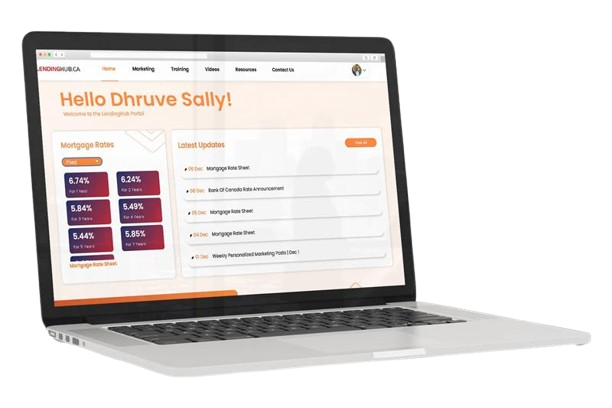Beyond Success, Endless Opportunities Await.
LendingHub is not just about mortgages; it's about exploring new horizons, innovating in the industry, and ultimately succeeding together. Join LendingHub and discover a career where success is not just a destination but a continuous, exciting journey.

Why Join LendingHub?
Your Achievement
Beyond Your
Expectations
 Flourish Amidst Positivity, Motivation, and amazing Environment
Flourish Amidst Positivity, Motivation, and amazing Environment 24/7 Support for All Your Questions and Requirements
24/7 Support for All Your Questions and Requirements Navigating Regulatory Compliance with Seasoned Guidance
Navigating Regulatory Compliance with Seasoned Guidance A Vibrant Network for Building Lasting Professional Bonds
A Vibrant Network for Building Lasting Professional Bonds Mentorship by Experts and Customized Personal Growth Initiatives
Mentorship by Experts and Customized Personal Growth Initiatives

Why LendingHub?

Premier Choice for Mortgage Agents
Our commitment to providing top-tier service, combined with unmatched lender access, continuous education, and cutting-edge technology, creates an environment where success is not just encouraged but expected.

Empowerment through Unparalleled Support
Our supportive community fosters an environment where continuous learning and growth are the norm. With expert guidance and customized development initiatives, every agent is equipped to thrive in the ever-evolving landscape of the mortgage industry

Innovation, Community, and Success
Our cutting-edge technology, combined with a supportive atmosphere and tailored development programs, ensures that every agent thrives. Experience unparalleled growth in an environment where your success is not just a goal but a shared accomplishment.
Innovative
Technology
Utilize our cutting-edge technology to digitize the entire mortgage process, freeing agents from administrative burdens
Leverage personalized data insights to craft tailor-made mortgage packages, catering to clients' unique financial needs
Stay ahead in the mortgage industry with real-time market updates and insights, seizing profitable opportunities as they arise.
Rest assured, our data-driven solutions prioritize compliance, making it effortless for mortgage agents to adhere to regulations while delivering exceptional service.
Boost productivity by automating routine tasks, empowering you to concentrate on building relationships, closing deals, and expanding your business.

Keep Learning And Earning

What is the Land Transfer Tax in Brampton?
If you’re buying a home in Brampton, there’s one cost that often catches people off guard—the land transfer tax in Brampton. I’ve noticed that many buyers focus on the down payment and mortgage approval. However, they often overlook the money due on closing day. Then suddenly, the numbers feel overwhelming.
When I first started learning about real estate costs, the land transfer tax felt confusing and unnecessary. Buying a home should be an exciting experience, not a stressful one. But hidden costs can quickly turn excitement into anxiety.
The good news is that once you understand how the land transfer tax works in Brampton, it becomes much easier to plan and budget properly.
In this article, I’ll explain what the tax is, how much you pay, who pays it, and when it’s due. I’ll clear up a big misconception—whether Brampton has an extra municipal land transfer tax like Toronto.
Ontario Land Transfer Tax (LTT) Explained
First, let me clear something up.
The land transfer tax in Brampton is actually an Ontario tax, not a Brampton-specific one. The province of Ontario charges this tax whenever a property changes ownership.
This tax applies when you buy:
- A house
- A condo
- A townhouse
- Vacant land
- Commercial property
You pay the tax based on the purchase price of the property. The higher the price, the higher the tax.
The land transfer tax gets paid one time only, and it’s due on closing day. Your real estate lawyer usually collects it and sends it to the province on your behalf.
Does Brampton Have a Municipal Land Transfer Tax?
This is one of the most common questions I hear.
The Key Difference: Toronto vs. Everywhere Else (Including Brampton)
Here’s the good news.
Brampton does NOT have an extra municipal land transfer tax.
Only the City of Toronto charges an additional municipal land transfer tax on top of the Ontario tax. If you buy in Toronto, you pay the tax twice.
If you buy in Brampton, you only pay:
Ontario Land Transfer Tax
That alone makes buying in Brampton more affordable compared to Toronto. Many buyers move to Brampton for this exact reason.
Current Brampton Land Transfer Tax Rates & Calculator
Since Brampton uses Ontario’s system, the Brampton land transfer tax follows Ontario’s tax brackets.
Current Ontario LTT Tax Brackets & Rates
| Purchase Price Portion | Tax Rate |
| Up to $55,000 | 0.5% |
| $55,000 – $250,000 | 1.0% |
| $250,000 – $400,000 | 1.5% |
| $400,000 – $2,000,000 | 2.0% |
| Over $2,000,000 | 2.5% |
The tax is calculated progressively, just like income tax. Each portion of the price gets taxed at a different rate.
How to Calculate Your LTT in Brampton: Step-by-Step
Let me make this easy. Here’s how I calculate the land transfer tax in Brampton:
- Break the purchase price into tax brackets
- Apply the correct rate to each portion
- Add everything together
You don’t pay one flat rate on the full price. Each part of the price gets taxed differently.
Free Brampton LTT Calculator Tool & Example
Many buyers use online calculators, but I always suggest understanding the math yourself, too. That way, you can budget properly.
Example Calculation for an $850,000 Detached Home in Brampton
Let’s break it down:
- First $55,000 × 0.5% = $275
- Next $195,000 × 1.0% = $1,950
- Next $150,000 × 1.5% = $2,250
- Remaining $450,000 × 2.0% = $9,000
Total Land Transfer Tax = $13,475
That’s the Brampton land transfer tax payable at closing—before any rebates.
Who Pays the Land Transfer Tax in Brampton?
This part is straightforward to understand.
Buyer’s Responsibility at Closing
If you’re buying a home in Brampton, you are responsible for paying the land transfer tax. The seller does not pay this tax at all.
On closing day, your real estate lawyer collects the land transfer tax from you and submits it to the province on your behalf. Without this payment, the home cannot legally be transferred into your name, which means the deal cannot be completed.
That’s why it’s so important to plan for this cost early. The land transfer tax can be a significant expense, and many buyers overlook it when budgeting for a home. Preparing ahead helps you avoid last-minute stress and ensures a smooth closing process.
Curious about mortgage refinancing in Canada? Learn how it works, when it makes sense, and how you can save money or access extra funds for your home.
Special Cases: Family Transfers, Builders, and More
Many people think property transfers between family members are always tax-free. That’s not always true.
1. Gifted properties
Even if a home is given as a gift, land transfer tax may still apply based on the property’s value.
2. Builder purchases
Buying from a builder follows the same land transfer tax rules as any other home purchase.
3. Spousal transfers
Transfers between spouses may be exempt, but only in certain situations.
How to Save Money: Ontario & Brampton LTT Rebates
Now let’s talk about saving money.
First-Time Home Buyer Rebate (Ontario)
Ontario offers a first-time buyer rebate that reduces the land transfer tax in Brampton.
Maximum Rebate Amount & Eligibility Rules
- Maximum rebate: $4,000
- Applies only to Ontario LTT
- Automatically applied at closing by your lawyer
Qualifications for “First-Time Buyer” in Ontario
You qualify if:
- You have never owned property anywhere in the world
- Moreover, you are at least 18 years old
- Also, you live in the home for 9 months
If two buyers purchase together, both must qualify to receive the full rebate. Because these rules can be confusing, it’s best to check with a real estate lawyer to know if the land transfer tax applies to your situation.
Are There Other Rebates or Refunds?
In some cases, refunds apply for:
- Canceled agreements
- Errors in registration
- Certain family transfers
These are rare, but a lawyer can guide you.
Common Mistake: Don’t Lose Your Rebate at Closing
Some buyers lose their rebate because of small, simple mistakes. Avoid these problems:
- The home is bought as a rental or investment instead of a main home
- The wrong name is listed on the property title
- The buyer does not move in on time
Before closing day, confirm your rebate details with your lawyer to ensure you don’t miss out on money you deserve.
Learn why big banks push 5-year fixed rates and how it affects your mortgage choices. Find out if a shorter or variable term could save you money.
Closing Costs in Brampton: More Than Just Land Transfer Tax
Land transfer tax is only one of the costs you pay when buying a home. There are several other expenses buyers should plan for before closing day.
Here are common additional closing costs:
1. Legal Fees and Disbursements
Most buyers pay between $1,500 and $2,500, depending on how complex the purchase is.
2. Title Insurance
A one-time fee that protects you from ownership and title-related issues.
3. Adjustment Costs
These cover items the seller paid in advance, such as property taxes, utilities, or condo fees, which you reimburse at closing.
When planning your budget, it’s also smart to look at current mortgage rates in Brampton to understand your full monthly and upfront costs.
Pro Tips for Brampton Home Buyers
Plan for land transfer tax early
Include land transfer tax in your budget before you start home shopping. This helps you avoid surprises and keeps your buying process stress-free.
Work with a real estate lawyer
A real estate lawyer helps you by:
- Calculating the correct land transfer tax
- Applying for rebates you qualify for
- Avoiding delays or issues on closing day
With the right support, buying a home in Brampton becomes easier, safer, and more confident.
Looking for the best HELOC rates in Ontario? Our experts compare options, help you understand your borrowing power, and guide you to smart decisions for your home financing needs.
Pro Tips for Brampton Home Buyers
1. Know the Market Dynamics
- Brampton is part of the Greater Toronto Area (GTA). It is high-demand and fast-moving. Homes can sell quickly, often above asking price.
- Detached homes are highly competitive, while condos and townhouses may offer more affordable options.
- Check average prices by neighborhood—some areas like Heart Lake or Mount Pleasant may offer better value than central Brampton.
2. Get Pre-Approved, Not Just Pre-Qualified
- Pre-approval gives you a realistic budget and shows sellers you’re serious.
- Rates can fluctuate, so locking in a rate may give you an advantage.
- Factor in land transfer tax, legal fees, home inspection, and maintenance costs.
3. Research Neighborhoods Thoroughly
- Consider commute times to Toronto or major employment hubs. Brampton has highways 410, 407, and GO Transit access.
- Schools, parks, and amenities matter if you have a family. Check Fraser Institute school rankings.
- Look at future development plans; new condos or infrastructure can affect property values.
4. Work With a Local Real Estate Agent
- Brampton’s market moves fast—having an agent familiar with micro-neighborhood trends is critical.
- They can give early access to listings and pre-market opportunities.
- Negotiation tips: agents know when bidding wars happen and how to make offers attractive without overpaying.
5. Inspect Everything Carefully
- Even in a hot market, don’t skip home inspections. Older Brampton homes may have foundation, roofing, or plumbing issues.
- Pay attention to basement moisture; Brampton has clay soil that can lead to drainage issues.
- Consider additional inspections: pest, electrical, and HVAC.
6. Factor in Resale Potential
- Even if it’s your dream home, think about future resale value.
- Features that improve resale: garage space, finished basement, modern kitchen, and proximity to transit.
- Neighborhoods with good schools and amenities retain value better.
7. Timing Your Purchase
- Spring often sees more listings but also more competition.
- Winter can yield better deals with fewer buyers, though inventory is limited.
- Interest rates and mortgage rules heavily influence affordability—watch Bank of Canada updates.
8. Don’t Overextend Yourself
- Aim for a mortgage where monthly payments are below 30-35% of your gross income.
- Factor in property taxes (~$4–6k/year for an average Brampton detached home) and condo fees if applicable.
- Leave a buffer for unexpected repairs or renovations.
9. Consider New vs. Resale Homes
- New builds: Modern layouts, warranties, and less maintenance. But sometimes overpriced in hot markets.
- Resale homes: Often more affordable, better locations, but may require updates.
10. Look Beyond the Price Tag
- Noise, traffic patterns, and neighbors impact lifestyle.
- Take multiple visits at different times of day before committing.
- Check property taxes and utility costs for long-term budgeting.
Conclusion: Land Transfer Tax in Brampton Made Simple
One of the benefits of buying a home in Brampton is that you only pay the Ontario land transfer tax. Unlike Toronto, there’s no extra city tax, which makes Brampton more affordable for first-time buyers, families, and investors.
It’s important to plan for this tax early. Many buyers focus only on the price of the home and forget about the tax. Budgeting ahead ensures you won’t be surprised by extra costs and helps you understand your true total expenses.
If you’re a first-time buyer, check if you qualify for a land transfer tax rebate. This can save you thousands and make buying a home much easier. Knowing about the rebate ahead of time means you won’t miss out on this benefit.
Working with experienced professionals makes the process even easier. They can guide you through the calculations, paperwork, and deadlines, so you can focus on finding the right home without stress.
With the right preparation, the land transfer tax in Brampton is simple and manageable. Brampton’s lower tax compared to Toronto is one of the many reasons it’s a smart choice for buyers in the GTA.

Understanding the Land Transfer Tax in Toronto
Buying a home in Toronto involves more than choosing a location or arranging financing. Every buyer must also understand government charges. One of the most important charges is the land transfer tax in Toronto. This tax applies the moment ownership legally changes. You must pay it at closing, not later.
The land transfer tax works differently in Toronto than in most Ontario cities. Toronto follows its own tax rules in addition to provincial rules. Because of this structure, buyers pay more here than in nearby regions. Planning without understanding this tax leads to budget gaps.
I wrote this guide to simplify everything. I explain what the tax means, how it works, and how much you must pay. You will learn how to calculate costs with confidence. Also, you will know what to expect before signing documents.
What Is the Land Transfer Tax in Toronto? (The “Double” Tax Explained)
When you buy property in Ontario, you must pay a provincial Land Transfer Tax. This applies everywhere in the province. However, Toronto adds an extra layer.
Buyers inside city limits must also pay the city of Toronto land transfer tax. This is why people call it the double land transfer tax in the Toronto system.
Provincial Land Transfer Tax
Ontario charges this tax when property ownership changes. The buyer pays it, not the seller. The amount depends on the purchase price and follows a tiered rate system.
City of Toronto Land Transfer Tax
The City of Toronto adds its own tax on top of the provincial one. The rates closely match the provincial structure, which means your total cost doubles in most cases.
Together, these two taxes form what many people casually call the land transfer fee in Toronto. It is paid on closing day and must be ready in certified funds.
If you buy outside Toronto, you only pay the provincial portion. That difference alone makes Toronto purchases feel much more expensive.
How to Calculate Land Transfer Tax in Toronto: A Step-by-Step Guide
This is the part most buyers worry about. Numbers can feel intimidating. Let me walk you through how to calculate land transfer tax in Toronto in a simple way.
Step 1: Know the Rate Brackets
Both the province and the city use tiered rates. Each portion of your purchase price gets taxed at a different percentage.
Step 2: Apply Provincial Rates
Ontario uses these brackets:
- 0.5% on the first $55,000
- 1.0% on $55,001 to $250,000
- 1.5% on $250,001 to $400,000
- 2.0% on $400,001 to $2,000,000
- 2.5% above $2,000,000 (single-family homes)
Step 3: Apply City of Toronto Rates
The City of Toronto Land Transfer Tax uses the same structure. That means you calculate it twice.
Example: $850,000 Toronto Home
Let me show you a real example.
Provincial LTT
- First $55,000 × 0.5% = $275
- Next $195,000 × 1.0% = $1,950
- Next $150,000 × 1.5% = $2,250
- Remaining $450,000 × 2.0% = $9,000
Provincial total: $13,475
Municipal TLTT
- Same calculation = $13,475
Total land transfer tax in Toronto: $26,950. That combined number is the land transfer fee in Toronto you must budget for.
Toronto Land Transfer Tax Rates and Brackets (Current)
| Purchase Price Range | Provincial Land Transfer Tax Rates | City of Toronto Land Transfer Tax Rates |
| First $55,000 | 0.5% | 0.5% |
| $55,001 – $250,000 | 1.0% | 1.0% |
| $250,001 – $400,000 | 1.5% | 1.5% |
| $400,001 – $2,000,000 | 2.0% | 2.0% |
| Over $2,000,000 | 2.5% | 2.5% |
Who Pays the Toronto Land Transfer Tax? Exemptions and Rebates
In most cases, the buyer pays the tax. However, there are ways to reduce it.
First-Time Homebuyer Rebates
This is where many buyers save money. Ontario offers a rebate of up to $4,000. Toronto offers an additional rebate of up to $4,475.
Together, you can save up to $8,475 if you qualify. These rebates directly reduce your land transfer tax in Toronto.
To qualify, you must:
- Be at least 18 years old
- Never have you owned property anywhere in the world
- Live in the home as your primary residence
Other Exemptions
Some transfers between spouses may qualify for exemptions. Certain corporate restructures may also qualify. A real estate lawyer should always confirm eligibility.
Why This Tax Hurts Buyers the Most?
Sometimes, I often hear the same pain points from buyers.
- “I did not know Toronto had two taxes.”
- “I underestimated my closing costs.”
- “Or I had enough for the down payment but not for the tax.”
The double land transfer tax in the Toronto system forces buyers to plan carefully. It affects affordability and can limit how much home you can realistically buy.
What Happens If Land Transfer Tax Is Paid Late?
The land transfer tax must be paid on time. Late payment can lead to:
- Penalties and interest
- Delays in registering ownership
- Legal complications
In severe cases, the property cannot be transferred. Working with a lawyer ensures payments are made correctly and on time.
For self-employed buyers, new business loans in Ontario may support liquidity planning. These loans can help preserve personal savings while meeting closing obligations.
Strategies to Manage or Offset the Cost of Land Transfer Tax
Land transfer tax is a required cost when buying property in Toronto. It cannot be avoided. However, it can be managed with proper planning. Smart strategies help buyers reduce stress and improve cash flow at closing.
1. Budget for Land Transfer Tax Early
Early budgeting is essential. The land transfer tax should be planned before making an offer. Toronto buyers pay two taxes:
- Ontario Land Transfer Tax
- Toronto Municipal Land Transfer Tax
Together, these costs can be high. Planning early provides clear advantages.
Why early budgeting matters:
- Prevents last-minute financial pressure
- Clarifies total closing costs
- Supports stronger purchase decisions
When the land transfer tax is included in the initial budget, the buying process becomes smoother and more predictable.
2. Adjust the Offer Price When Possible
The purchase price directly affects the land transfer tax. A lower price means a lower tax.
In competitive markets, buyers often focus only on securing the property. However, adjusting the offer price slightly can reduce the total cash needed at closing.
Benefits of price adjustments include:
- Lower land transfer tax
- Reduced upfront cash requirements
- Better overall affordability
A well-planned offer considers total ownership costs, not just the sale price.
3. Use the Right Financing Tools
Financing options can help manage short-term cash needs. Some buyers consider second mortgage rates in Toronto to access additional funds at closing. This strategy can help bridge temporary gaps in liquidity.
4. Speak With Professionals First
Every financing solution carries risk. Professional advice is critical. Mortgage brokers, financial advisors, and real estate lawyers can help assess:
- Interest rates and repayment terms
- Long-term financial impact
- Legal and lending requirements
Common Mistakes Buyers Make With Land Transfer Tax
Many home buyers make the same mistakes when dealing with the land transfer tax. These errors are common. They are also expensive. Knowing them early helps buyers avoid stress and extra costs.
Forgetting to Add the Tax to Cash Planning
The land transfer tax is paid on the closing day. It is not part of the down payment. Some buyers forget to include this tax in their cash plan. As a result, problems arise at the last moment. This mistake can lead to:
- Not enough cash at closing
- Emergency borrowing
- Delays in the purchase
Adding land transfer tax to the budget early helps avoid these issues.
Thinking Rebates Apply Automatically
First-time buyers may qualify for land transfer tax rebates. However, rebates do not apply on their own. Paperwork is required. Eligibility rules must be met. Common problems include:
- Missing documents
- Wrong assumptions about eligibility
- Expecting money without applying
Mixing Up Toronto Rules With Other Cities
Toronto has different land transfer tax rules. These rules are not the same as those in other Ontario cities. Toronto buyers must pay:
- Ontario land transfer tax
- Toronto municipal land transfer tax
Because of this, costs are higher. Confusing these rules often leads to budget surprises. Knowing Toronto-specific rules helps buyers plan better.
Waiting Too Long to Speak With a Lawyer
A real estate lawyer is essential in any property purchase. Lawyers help with:
- Confirming land transfer tax amounts
- Explaining rebates
- Reviewing closing costs
Waiting too long can cause errors. Speaking with a lawyer early avoids costly mistakes.
Why Avoiding These Mistakes Is Important?
Land transfer tax is one of the biggest closing costs in Toronto. Simple mistakes can cause:
- Financial stress
- Closing delays
- Unnecessary frustration
Others explore private lenders in Ontario. These lenders often provide flexible approval options when traditional financing is limited. This can be useful, but terms should always be reviewed carefully.
How Toronto Compares to Other Cities?
Buyers often ask why Toronto feels so different. The answer is simple. Other Ontario cities only charge the provincial tax.
If you want to understand how this compares elsewhere, reading a guide to land transfer tax and buyer programs in Ajax can be very helpful. It shows how much Toronto truly stands apart.
Ask Questions About Land Transfer Tax in Toronto
1. Do buyers pay land transfer tax every time they buy property?
Yes. Buyers pay land transfer tax every time they purchase property. The tax applies to houses, condos, and vacant land. Repeat buyers also pay the tax on each purchase.
2. Do lenders include land transfer tax in the mortgage?
No. Lenders do not include the land transfer tax in the mortgage. Buyers must pay it in cash on closing day.
3. Can buyers pay land transfer tax in installments?
No. Buyers must pay the full amount on closing day. The city does not allow partial or delayed payments. Late payment triggers penalties.
4. Do any exemptions remove the land transfer tax completely?
No. Most buyers must pay the tax. First-time buyer rebates reduce the amount, but buyers still pay part of the tax.
5. Do joint buyers qualify for first-time buyer rebates?
Sometimes. All buyers on title must meet first-time buyer rules. If one buyer owned property before, the rebate may decrease or disappear.
6. Do condos have a higher land transfer tax?
No. The purchase price sets the tax amount. Property type does not affect the rate. Buyers pay the same tax on condos, houses, and townhomes at the same price.
7. Do buyers pay land transfer tax on gifted property?
Yes. Buyers may still owe land transfer tax on gifted property. The city uses the property’s value to calculate the tax. Buyers should seek legal advice in these cases.
8. Can the land transfer tax change after accepting an offer?
Yes. The tax changes when the purchase price changes. Amendments or added costs can increase the final amount.
9. Who calculates and pays the land transfer tax?
A real estate lawyer calculates the final amount. The lawyer collects the funds and pays the tax on closing day.
10. What happens if a buyer does not pay the land transfer tax?
The city will not register ownership without payment. Closing may fail. The buyer may also face penalties and interest.
Final Thought
The city of Toronto's land transfer tax is a major but manageable part of buying a home. Once you understand how to calculate it, apply rebates, and plan, it becomes less intimidating. Knowledge gives you confidence, and confidence leads to better financial decisions.
If there is one takeaway I want you to remember, it is this: understanding the land transfer tax in Toronto early puts you in control.
This is why many buyers speak with a mortgage broker in Toronto early. A good broker helps you see the full financial picture, not just the mortgage payment.

How to Use a HELOC to Invest in Canada: A Strategic Guide to Building Wealth (Is It Right For You?)
Many Canadians get excited when they discover they can invest with a HELOC in Canada at interest rates. Now the big question is: Can you use that money to build more wealth?
A Home Equity Line of Credit (HELOC) is a revolving credit line secured against your home. The bank lets you borrow money using your home equity as security. You can borrow, repay, and borrow again—just like a credit card, but with much lower interest rates.
The idea sounds attractive. Borrow at a lower interest rate. Invest for higher returns. Build wealth sooner.
But is it smart?
Or is it risky?
We’ll talk about why people do it, how it works in the Canadian system, the tax rules, the risks, and whether this strategy is actually right for you.
What is a HELOC, and How Can It Be Used for Investing?
A HELOC, or Home Equity Line of Credit, is a type of loan that lets you borrow against the value of your home. It is usually between 65–80% of the home’s value, secured by your property. A HELOC works like a giant credit card backed by your house.
Think of it like a credit card, but with a much lower interest rate. Here is how it works in simple terms:
- Your home is worth more than what you owe on your mortgage
- The difference is called home equity
- A bank lets you borrow a portion of that equity
- You only pay interest on the amount you actually use
Unlike a regular mortgage, a HELOC is revolving. That means you can:
- Borrow
- Pay it back
- And borrow again
Now comes the big question.
Should you use this “cheap” borrowed money to invest and earn more than it costs you?
This is the core idea behind using a HELOC for investing.
In Canada, this strategy can be powerful because of:
- Lower interest rates
- Flexible borrowing
- And potential tax-deductible interest
Curious about accessing home equity later in life? Learn who offers reverse mortgages in Canada and how this option can provide financial flexibility.
Why Canadians Use a HELOC to Invest in Canada?
1. Access to Low-Cost Capital
One of the biggest reasons people invest in HELOC in Canada is the interest rate.
Most HELOCs are priced at:
- Prime rate + 0.5% to 1%
Compare that to:
- Credit cards: 19% to 25%
- Unsecured personal loans: 8% to 15%
That is a huge difference.
When borrowing costs are lower, it becomes easier for your investment returns to beat the interest you pay.
This is why many investors prefer a HELOC over an investment loan vs HELOC debate. A HELOC usually wins on flexibility and pricing.
2. Potential for Leverage & Amplified Returns
This is where things get interesting. Some Canadians use a strategy called the Smith Manoeuvre.
In very simple words:
- You convert non-deductible mortgage debt
- Into tax-deductible investment debt
As you pay down your mortgage:
- Your HELOC limit increases
- You borrow that amount
- And invest it
Over time, your home debt stays the same, but:
- Part of it becomes tax-deductible
- And your investments grow
This is why you often hear the Smith man oeuvre mentioned in Canada when people talk about HELOC investing.
This strategy is powerful, but it is not beginner-friendly. It requires discipline, planning, and professional advice.
3. Flexibility and Reusability
A HELOC is very flexible. Unlike a mortgage:
- You do not need to reapply every time
- You can borrow only what you need
- Also, you can repay anytime
This makes it useful for:
- Stock investing
- Rental property down payments
- Business opportunities
This flexibility is one reason people prefer it over refinancing. Many Canadians compare HELOCs vs. refinancing in Canada and choose a HELOC because it keeps their existing mortgage rate intact.
4. Tax Deductibility (The Key Incentive in Canada)
This is the biggest reason Canadians use a HELOC to invest.
Under CRA rules (Income Tax Act 20(1)(c)), interest may be tax-deductible if the borrowed money is used to earn income.
Examples include:
- Dividend-paying stocks
- Rental properties
- Income-generating businesses
Important points to understand:
- The investment must have a reasonable expectation of income
- Capital gains alone are not enough
- You must keep clear records
If done correctly, tax-deductible interest in Canada can significantly reduce the real cost of borrowing. This is why HELOC investing is often part of long-term wealth strategies.
Understand The Risks and Crucial Considerations
This is where many blogs stop being honest. So let me be very clear. Using a HELOC to invest is not safe, not guaranteed, and not for everyone.
1. Your Home Is on the Line
A HELOC is secured against your home. That means:
- If your investment fails
- And you cannot make payments
- Your home is at risk
This is not like losing money in a TFSA. This is real leverage.
A market crash + job loss can create serious stress. This is one of the biggest risks of using HELOC to invest.
2. Interest Rate Risk
HELOCs in Canada are variable-rate loans. When interest rates rise:
- Your monthly interest cost increases
- Even if your investment income stays the same
We saw this clearly during recent Bank of Canada rate hikes. You must be able to handle higher payments without panic selling your investments.
3. CRA Rules and Audit Risk
The CRA is very strict. If you:
- Mix personal and investment spending
- Do not keep proper records
- Cannot show income intent
Your interest deduction can be denied. This is why:
- Separate accounts matter
- Clear paper trails matter
- Professional tax advice matters
Many people lose deductibility simply because of poor record-keeping.
4. Cash Flow Pressure
Even if your investment performs well in the long run:
- You must pay HELOC interest every month
- Regardless of market ups and downs
If your cash flow is tight, this strategy can become stressful very quickly.
Key Strategies to Invest Using a HELOC in Canada
Now, let us talk about practical strategies Canadians actually use.
1. The Classic: Investing in Rental Property
Many investors use a HELOC for a down payment on a second property. This is common in Ontario and other high-priced markets.
How it works:
- Use HELOC for the down payment
- Get a mortgage for the rest
- Rent out the property
Things to calculate carefully:
- HELOC interest
- Mortgage payments
- Property taxes
- Insurance
- Maintenance
The goal is positive cash flow or at least manageable negative cash flow. This approach is discussed for HELOC for buying investment property strategies.
Some investors also explore home equity loans in Ontario instead of a HELOC, depending on the structure.
2. The Stock Market Portfolio (Smith Manoeuvre Lite)
This is a simpler version of the Smith Manoeuvre.
You:
- Borrow from HELOC
- Invest in dividend-paying Canadian stocks or ETFs
- Earn income
- Deduct interest
Popular choices include:
- Canadian banks
- Utilities
- Broad-market dividend ETFs
Dividends can be:
- Used to pay HELOC interest
- Or reinvested
This is one of the most common ways people invest with HELOC in Canada over the long term.
3. Investing in a Business or Side Hustle
Some homeowners use HELOC funds to:
- Start a business
- Expand an existing one
This can include:
- Online businesses
- Construction projects
- Franchise investments
However:
- The business must be legitimate
- There must be a clear profit motive
This is especially important if you are using funds for things like a loan for building construction or development projects. CRA scrutiny is higher here, so documentation is critical.
HELOC Repayment Rules: What You Need to Know to Stay on Track
A HELOC (Home Equity Line of Credit) gives you flexibility, but it’s important to know how repayment works. Here’s a simple breakdown:
- Interest-Only Payments: Many HELOCs let you pay just the interest each month, which keeps initial payments low.
- Pay Down Principal Anytime: You can reduce the amount you owe at any time without extra fees.
- Draw Period: During this phase, you can borrow, repay, and borrow again—like a flexible credit line.
- Repayment Period: After the draw period ends, you’ll need to pay back both the principal and interest.
- Variable Interest Rates: Your monthly payments may change if interest rates rise or fall.
- Minimum Payments: Lenders usually require a minimum monthly payment, so make sure you meet it.
Tip: Always review your lender’s specific rules before borrowing. Knowing the repayment terms helps you use your HELOC wisely and avoid surprises.
Should You Use a HELOC for a Down Payment?
Using a HELOC as a down payment can be a good idea in some cases, but it has risks. It helps if you don't have enough savings for a down payment, especially in a competitive housing market.
However, borrowing against your home means taking on more debt. You’ll need to manage both the mortgage and HELOC payments. If your financial situation changes or property values drop, it could become difficult. Ensure you can handle both payments before using a HELOC for a down payment.
Is Using a HELOC to Invest Right For You? A Checklist
Using a HELOC investment strategy can be powerful, but it is not for everyone. Here is a simple checklist you can walk through in your own mind before you decide to invest in a HELOC in Canada.
1. You have a stable, high income, and solid equity
This strategy works best if:
- Your household income is stable (salary or consistent self-employment) and comfortably covers all your current obligations.
- You have at least 20% equity in your home and are not stretched too thin with your existing mortgage.
If your job situation is uncertain or you are already stressed about payments, adding more debt—even “good” debt—can be dangerous.
2. You have a long-term horizon and higher risk tolerance
Leveraged investing is a long game. However, most experts suggest a minimum time horizon of 5–10 years or more to ride out market ups and downs. If short‑term volatility makes you lose sleep or you think you might need the money in a couple of years for something else, a HELOC investment strategy may not fit your personality or timeline.
You must be comfortable with the idea that your investments could drop in value while your loan balance stays the same, especially in the early years.
3. You have an emergency fund separate from your HELOC
A common mistake is treating the unused HELOC room as your emergency cushion. That’s risky when you’re already using the HELOC for investing. Better practice is to keep a separate cash emergency fund (for example, 3–6 months of expenses) and treat your HELOC borrowing strictly as part of your investing plan, not as a backup for day‑to‑day crises.
This separation can help you stay disciplined and avoid mixing personal and investment use, which also protects the tax deductibility of your interest.
4. You understand the tax rules and keep meticulous records
If you want tax-deductible interest in Canada, you must understand the basics of paragraph 20(1)(c) and the CRA’s “purpose test.” You should be willing to:
- Use a dedicated HELOC account solely for investment purposes.
- Transfer funds directly from the HELOC to your investment or business account.
- Keep copies of all statements and trade confirmations to prove the link if CRA ever asks.
If bookkeeping is something you dislike and you know you won't maintain accurate records, then using a HELOC for investing may create more audit risk and stress than it’s worth.
5. You can handle higher payments if interest rates rise
Before you invest in a HELOC in Canada, run a simple stress test:
- What does your monthly payment look like at your current HELOC rate?
- What if that rate goes up by 1–2%?
HELOC interest rates in Canada can and do move, and your lender’s prime rate is closely tied to the Bank of Canada’s policy rate. If a rate jump would force you to cut basic expenses or carry credit card debt, it’s a sign your plan might be too aggressive.
Planning to buy land in Ontario? Explore the best options for land financing in Ontario and find out how you can fund your property purchase with flexible loan solutions.
Final Verdict: A Powerful Tool, Not a Free Lunch
Using a HELOC to invest can be a wealth-building accelerator. But it is not magic money. It works because:
- You are using leverage
- You may reduce taxes
- Also, you stay invested long-term
It fails when:
- Risks are ignored
- Rates rise unexpectedly
- Cash flow is weak
This is why experts recommend:
- Speaking with a fee-only financial advisor
- Consulting a tax accountant who understands HELOC investing
- Learning before acting
If done right, a HELOC can be a strategic tool. If done wrong, it can create financial stress. Take your time. Learn the rules. And always protect your home first.

HELOC vs Refinance in Canada: Which Option Is Right for You
I know how confusing home equity options can feel. You work hard to build equity in your home. Then one day, you need money. Maybe for renovations. Maybe to pay off high-interest debt. Or maybe to invest or handle an emergency.
That’s when most Canadian homeowners ask the same question:
HELOC vs refinance in Canada — which one is better for me?
Most Canadian homeowners have two main ways to use their home equity:
- A Home Equity Line of Credit (HELOC)
- A Cash-Out Refinance
Both options give you access to money. But they work very differently.
I’ve seen many people choose the wrong option. Not because they were careless.
But because no one explained it clearly.
By the end, you will clearly know:
- How each option works
- The pros and cons
- When a HELOC makes sense
- When refinancing is the smarter move
Let's understand together.
What Is a Home Equity Line of Credit (HELOC)?
A Home Equity Line of Credit, or HELOC, is a flexible loan tied to your home. Think of it like a credit card. But with a much lower interest rate.
Here’s how it works in Canada.
A HELOC gives you a credit limit based on your home equity. Most lenders allow access to up to 65% of your home’s value, minus your mortgage balance. You don’t get the money all at once. Instead, you borrow only when you need it.
You can:
- Borrow
- Repay
- Borrow again
That’s why many Canadians use a home equity line of credit as a safety net.
Key Features of a HELOC
- It is a revolving credit
- You only pay interest on what you use
- Rates are usually variable
- Payments are often interest-only at the start
Due to this flexibility, a HELOC is easy to manage. However, that ease can also be risky if not used with care.
Why Canadians Use HELOCs
- Renovating in stages
- Emergency backup fund
- Education expenses
- Small business costs
What Is a Cash-Out Refinance?
A Cash-Out Refinance works very differently. Instead of adding a credit line, you replace your existing mortgage.
You take out a new, larger mortgage. The extra amount comes to you as cash in one lump sum.
For example:
- Old mortgage: $300,000
- New mortgage: $380,000
- Cash you receive: $80,000
That money is yours to use.
- Debt consolidation.
- Renovations.
- Investment.
Key Features of a Cash-Out Refinance
- One-time lump sum
- New interest rate
- New mortgage term
- And a new payment schedule
It’s also commonly used with services like loans for building construction when large funding is needed upfront.
You start paying principal and interest right away. This option is popular when rates are low or when people want stable payments.
HELOC vs Refinance in Canada: Which Option Saves You More?
| Feature | HELOC | Cash-Out Refinance |
| How do you get funds | Revolving credit line; borrow as needed | One lump‑sum cash at closing |
| Access to equity | Up to 65% of home value as HELOC portion (up to 80% combined with mortgage) | Up to 80% of the current home value in one new mortgage |
| Interest rate type | Mostly variable (Prime ± spread) | Fixed or variable, full mortgage rate |
| Payments at start | Often interest‑only during the draw period | Principal + interest from the first payment |
| Flexibility | High: repay and re‑borrow anytime within the limit | Low: fixed schedule; no re‑borrowing without another refinance |
| Upfront costs | Usually lower than full refinance | Higher: legal fees, appraisal, possible penalty to break old mortgage |
| Best for | Ongoing or uncertain costs, emergency funds, staged renos | Large, one‑time needs like big debt consolidation or major investment |
- HELOC gives freedom
- Refinance gives certainty
When to Choose a HELOC in Canada?
I often suggest a HELOC when flexibility matters most. You may want a HELOC if:
1. You Need Money in Stages
Renovations often happen slowly. A HELOC lets you pay contractors step by step.
2. You Want an Emergency Backup
Many Canadians keep a HELOC unused. It acts as a safety net during job loss or emergencies.
3. You Plan to Repay Quickly
Short-term borrowing helps limit interest costs.
4. You Are Okay With Variable Rates
HELOC rates change with the prime rate. You must be comfortable with payment changes.
A HELOC works well for smaller and ongoing needs. It pairs well with services like a loan for building construction or phased upgrades.
When to Choose a Cash-Out Refinance
Now let’s talk about refinancing. A cash-out refinance makes sense when you need a large amount.
You Want to Consolidate Debt
High-interest credit cards hurt your cash flow. A refinance often gives a lower rate.
You Want Predictable Payments
Fixed rates mean stable monthly costs.
Your Current Mortgage Rate Is High
Refinancing may lower your rate and give you cash at the same time.
You Prefer One Simple Payment
- One mortgage.
- One payment.
Many Canadians use refinancing when financing land in Ontario or making a major investment, as it provides a way to access home equity. This option allows them to secure funds for property purchases, renovations, or other significant financial opportunities without needing to sell their homes.
HELOC vs Refinance in Canada: Which Is Better?
HELOC (Home Equity Line of Credit)
Pros
- Flexible access to funds
- Interest-only payments
- Reusable credit
- Lower interest than credit cards
Cons
- Variable interest rates
- Easy to overspend
- Risk to your home
- Qualification rules
Mortgage Refinance
Pros
- Lower interest rate
- Access lump-sum cash
- Debt consolidation
- Predictable payments
Cons
- Closing and legal costs
- Prepayment penalties
- Extended loan term
- Less flexibility
HELOC vs Refinance Canada: The Break-Even Cost Factor
This part is very important. Yet many people ignore it. Refinancing comes with upfront costs, such as:
- Legal fees
- Appraisal fees
- Mortgage discharge fees
- Penalties for breaking your mortgage
Here’s a simple way to think about it.
Break-Even Formula
Total refinance costs ÷ monthly savings = break-even months
If it takes 36 months to break even, you should stay in the home longer than 3 years. If not, refinancing may cost more than it saves.
A HELOC usually has lower upfront costs. That’s why some homeowners start with a HELOC instead.
Essential Risks and Downsides to Consider
No matter which route you choose, you’re still borrowing against your home. So let’s be honest about the risks. Understanding these upfront helps you avoid painful surprises later.
HELOC Risks
- Variable rates can rise. If the Bank of Canada increases rates, your HELOC rate usually climbs too, and your minimum payment can jump.
- Easy access can lead to overspending. Because it feels like “available money,” it’s tempting to swipe the line for trips, gadgets, or lifestyle upgrades, not just smart investments.
- The lender can reduce or freeze your limit. If your income drops, your home value falls, or your credit weakens, a lender can cut back your HELOC in some situations.
Refinance Risks
- You reset your amortization. If you move from, say, a 15-year term to a 25‑year term, you can end up paying more total interest over the life of the loan, even with a lower rate.
- Breaking your current mortgage can be costly. Prepayment penalties, discharge fees, and other charges can eat into your savings.
- You take on a larger debt. A bigger mortgage means more risk if your income changes.
Those choices involve a different set of risks and should be weighed alongside HELOC and refinance options if you’re nearing retirement.
Confused about borrowing options? Learn the key differences, benefits, and risks in our detailed comparison of reverse mortgage vs home equity loan or line of credit before making a smart financial decision.
What is the 2% Rule for Refinancing?
When it comes to refinancing your mortgage, the 2% rule can help you quickly determine if refinancing is a smart financial move. Simply put, the 2% rule suggests that if you can lower your mortgage interest rate by at least 2% compared to your current rate, it might be worth refinancing.
Why is the 2% Rule Important?
Refinancing isn't just about lowering your monthly payments—it's about saving money in the long run. By securing a lower interest rate, you reduce the amount of interest you pay over the life of the loan, which can add up to huge savings.
Example:
Imagine you’re currently paying 6% on your mortgage. If you refinance to a 4% rate, the savings over 30 years could be substantial. The 2% rule helps you know when the potential benefits outweigh the costs of refinancing, like closing fees and other expenses.
But, There’s More to It
The 2% rule is a helpful starting point, but it’s not the whole picture. You also need to consider:
- Loan Term: Refinancing might reset the clock on your mortgage, extending the term or altering your payment schedule.
- Closing Costs: Refinancing usually comes with fees. If your new rate doesn't save you enough to cover those costs, it may not be worth it.
- Your Financial Goals: Are you planning to stay in the home long-term, or are you looking to sell soon? If you're moving soon, refinancing might not provide enough time to recoup the costs.
Is It Always the Right Time to Refinance?
The 2% rule can act as a helpful benchmark, but you should always take a holistic approach. Consider factors like your financial situation, your credit score, and the overall state of the mortgage market. Consulting with a mortgage broker or financial advisor can also help you make a well-informed decision.
In summary, the 2% rule for refinancing is a good starting point to assess whether refinancing will be worth your while—but it’s important to factor in all the details to ensure it aligns with your long-term financial goals.
Why is the 2% Rule Important?
Refinancing isn't just about lowering your monthly payments—it's about saving money in the long run. By securing a lower interest rate, you reduce the amount of interest you pay over the life of the loan, which can add up to huge savings.
Example:
Imagine you’re currently paying 6% on your mortgage. If you refinance to a 4% rate, the savings over 30 years could be substantial. The 2% rule helps you know when the potential benefits outweigh the costs of refinancing, like closing fees and other expenses.
But, There’s More to It
The 2% rule is a helpful starting point, but it’s not the whole picture. You also need to consider:
- Loan Term: Refinancing might reset the clock on your mortgage, extending the term or altering your payment schedule.
- Closing Costs: Refinancing usually comes with fees. If your new rate doesn't save you enough to cover those costs, it may not be worth it.
- Your Financial Goals: Are you planning to stay in the home long-term, or are you looking to sell soon? If you're moving soon, refinancing might not provide enough time to recoup the costs.
Is It Always the Right Time to Refinance?
The 2% rule can act as a helpful benchmark, but you should always take a holistic approach. Consider factors like your financial situation, your credit score, and the overall state of the mortgage market. Consulting with a mortgage broker or financial advisor can also help you make a well-informed decision.
In short, the 2% rule for refinancing is a good starting point to assess whether refinancing will be worth your while—but it’s important to factor in all the details to ensure it aligns with your long-term financial goals.
FAQ: Should I Get a HELOC or Refinance?
Q: Which has lower costs upfront?
In most cases, a HELOC has lower upfront costs than a full cash‑out refinance. Because you’re not fully replacing your mortgage, and penalties may be smaller or avoided. You’ll still see legal and appraisal fees, but they tend to be lighter than a full refinance package.
Q: Which is better for debt consolidation?
Often, a cash‑out refinance is better for large debt consolidation because you roll everything into one mortgage at a single, usually lower, rate and a fixed repayment plan. A HELOC can also be used for consolidation. But the variable rate and interest‑only option can tempt you to pay more slowly. Also, it keeps the balance hanging around for years.
Q: Can I get a HELOC and keep my mortgage?
Yes. Many Canadians have a regular mortgage plus a HELOC attached to the same property. The mortgage is the main loan, and the HELOC sits on top as a revolving line for extra needs. Some banks market this as a combined “readvanceable” mortgage where your HELOC limit can grow as you pay down the main mortgage.
Q: Does a HELOC affect my credit score?
Yes, it can. A HELOC is a revolving credit product, so the limit and usage can impact your credit utilization ratio and overall profile. A very high limit or maxed‑out HELOC may reduce your score. While smart use and steady payments can help your credit over time.
How does this Compare to Reverse Mortgages in Canada?
Reverse mortgages are very different.
- They are usually for seniors aged 55+.
- No monthly payments.
- But interest compounds over time.
Before deciding on a reverse mortgage, it’s essential to consider: "Are reverse mortgages a good idea in Canada?" While they offer a way to access home equity, especially for seniors, they also carry notable downsides.
Real-Life Example: HELOC vs Refinance Canada
Let me make this real.
Sarah owns a home in Ontario. She needs $40,000 for renovations.
She chooses a HELOC. She uses only $25,000 at first. And she pays interest only. Later, she repays part of it.
Now compare Mark.
Mark has $60,000 in credit card debt. He refinances his mortgage. He locks in a lower fixed rate. One payment. Less stress.
When you look at a home equity line of credit vs a cash-out refinance, both choices are smart. Because both matched the goal.
Final Verdict: HELOC vs Refinance Canada
So what’s the answer? There is no one-size-fits-all solution.
Choose a HELOC if:
- You want flexibility
- You need funds over time
- Or you want a backup emergency option
Choose a Cash-Out Refinance if:
- You need a large lump sum
- You want stable payments
- Or you plan to stay in your home long-term
The HELOC vs refinance Canada decision depends on your goals, not trends.

Is Debt Consolidation a Smart Choice in Canada: Complete Guide
Is debt consolidation a smart choice for you? That’s a common question people ask. Debt consolidation means you take all your debts and combine them into one payment. This can make things simpler and help you save money.
But is it always the best option? Not for everyone.
For many people, this one change helps reduce stress. It can even lower the amount you pay each month, which gives you more breathing space in your budget.
You don’t have to remember different dates or worry about missing a bill. However, debt consolidation is not the perfect choice for everyone.
It works best when you truly want to take control of your spending, avoid adding new debt, and follow a clear plan to become debt‑free.
If you have ever thought, “Is debt consolidation smart, or am I making a mistake?” this guide is for you. By the end, you will know the key questions to ask, the red flags to watch for. Also, you will get the smarter alternatives to consider before putting your home on the line.
What Is a Debt Consolidation Mortgage Refinance in Canada?
A Debt Consolidation Mortgage Refinance in Canada is a way to combine all your debts into one loan. This means you can pay off things like credit cards or personal loans by using your mortgage.
Here’s how it works.
You take out a new mortgage for more money than your current mortgage. The extra money is used to pay off your other debts. Now, instead of making several payments to different companies, you only need to make one payment for your mortgage.
The good part is that you pay less interest, which helps you save money over time. It also makes managing your money easier because you have fewer bills to keep track of.
But there is a risk. You use your house as security for this loan. If you miss payments, you can lose your home. So, it’s important to be sure you can afford the new payments before you refinance.
How does Debt Consolidation Work?
Here is a basic example that you can easily follow:
- Current mortgage balance: $300,000
- Your home’s current value: $600,000
- Maximum equity you can tap (about 80% of value): $480,000
- Available equity: $480,000 − $300,000 = $180,000
Now you have $180,000 equity to use.
Let’s say you have these other debts:
- Credit cards + personal loan = $40,000
You refinance your mortgage to:
- New mortgage: $340,000
($300,000 original + $40,000 debt to pay off)
Now you pay one mortgage payment instead of many high-interest bills. The credit cards and loans are gone. You now owe less expensive mortgage debt.
Before we go deeper, if you want to learn more about how refinancing works in general, you can read: What is Mortgage Refinancing in Canada.
Why Some People Ask “Is Debt Consolidation Smart?”
Before we go deeper, let me speak to your pain points.
Are you struggling with:
- High credit card interest?
- More than one payment every month?
- Stress about money every day?
- Feeling like you’ll never get out of debt?
If yes, you are not alone. Many Canadians feel this way. In some cases, debt consolidation can be an answer. But it is not perfect for everyone.
Is Debt Consolidation Smart? The Major Pros
Let’s look at the reasons why many Canadians feel debt consolidation mortgage refinancing is smart. And in some cases, it truly is.
1. Lower Interest Rate = Massive Savings
Credit cards in Canada often charge between 19% and 29%.
Personal loans can charge 10%–15%.
But most mortgages charge 5%–7%.
That is a huge difference.
Let’s look at the math.
If you have $40,000 in credit card debt at 24% interest, you might pay thousands each year in interest alone.
But if you roll that same $40,000 into a mortgage at 6%, your interest costs drop massively.
This is why many Canadians say debt consolidation refinance feels like a “fresh start.”
2. Simpler Finances = Less Stress
If you’re like most people, keeping track of multiple payments is stressful.
And when interest rates rise, it becomes even more overwhelming.
When you consolidate through a refinance:
✔ One payment
✔ One due date
✔ One interest rate
✔ One simple plan
That’s it. Your financial life becomes easier overnight.
3. Lower Monthly Payments = More Breathing Room
When you refinance, your debt is spread over a long period — sometimes up to 25 years. This makes your monthly payment drop significantly.
You instantly free up room in your monthly budget.
And you can use that money for savings, emergencies, or paying your mortgage faster.
Many families choose to refinance because they simply want some breathing room during tough times.
4. It Can Improve Your Credit Score
When you refinance, your high-interest balances get paid off.
This lowers your credit utilisation ratio, which is one of the biggest factors in your credit score.
If your credit cards are maxed out right now, refinancing might actually boost your credit score within a few months — as long as you don’t start using those cards again.
5. You Keep Your Home and Avoid Bankruptcy
A debt consolidation mortgage can be a smart way to avoid:
- Bankruptcy
- Consumer proposal
- Collection calls
- Legal action
- Wage garnishment
You stay in control.
You keep your assets.
Or you keep your dignity.
For many people, that peace of mind alone makes the refinance worth considering.
The Crucial Cons & Hidden Dangers
Now, this is where things get serious. Because yes — refinancing to consolidate debt has pros. But it also has big risks that you must understand. Let’s understand them one by one.
1. You Are Securing Unsecured Debt with Your Home
This is the biggest risk and the one that almost every lender forgets to explain clearly. Credit card debt is unsecured. If you miss a payment, it hurts your credit score, but no one takes your home.
But once you consolidate, all that credit card debt becomes part of your mortgage. If you miss mortgage payments, you risk:
- Power of sale
- Foreclosure
- Losing your home
That’s a huge difference. This is why I always tell people to think twice before turning unsecured debt into secured debt.
2. You Pay Much More Interest Over the Long Term
Here’s the hidden truth:
A lower monthly payment does NOT always mean you are saving money. If you spread your $40,000 debt over 25 years, you may pay more interest overall — even at a lower rate.
You may end up paying interest for decades on money you used years ago for:
• A vacation
• A car repair
• A laptop
• Clothes
• Random purchases
This is why some people regret refinancing later.
3. It Doesn’t Fix Spending Habits
Debt consolidation is not a cure for overspending. If you consolidate your debts but continue spending, you may end up with:
- A bigger mortgage
- New credit card debt
This situation becomes a financial disaster fast. So before refinancing, ask yourself: “Have I truly solved the behaviour that caused this debt?”
If not, consolidation is just a temporary patch, not a real solution.
4. Refinancing Comes with Fees
Many Canadians don’t realise that refinancing is not free. You may need to pay:
• Legal fees
• Appraisal fees
• Title insurance
• Administrative costs
• Mortgage break penalty (very common with fixed rates)
If you're already tight on money, these fees can feel heavy. That’s why working with expert mortgage brokers in Canada helps you compare your true costs before making a big decision.
5. You Reduce Your Home Equity
Your home equity is your financial safety net. You can use it later for emergencies, retirement, investments, or plans. But once you refinance and use that equity to pay off debt, you reduce your cushion.
This can limit you later when you want to:
• Sell and upgrade
• Start a business
• Buy an investment property
• Handle an emergency
Is Debt Consolidation Smart? Pros and Cons Overview
Here is a simple table to compare a debt consolidation mortgage refinance in Canada to some other options.
| Option / Factor | Interest rate range | Risk to the home | Term length | Main benefit | Main drawback |
| Debt consolidation mortgage refinance | Usually 5–7% vs 19–29% cards | Yes | 20–30 years | One payment, lower rate, big cash‑flow relief | Can pay much more interest over time; home at risk |
| Unsecured debt consolidation loan | Lower than cards, higher than mortgage | No | 3–7 years | Fixed end date, no home security | Payment may still be high vs refinance |
| Balance transfer credit card | 0–5% promo, then higher | No | 6–18 months promo | Very low short‑term interest | Needs strict discipline; high rate after promo |
| HELOC (home equity line of credit) | Often slightly above prime | Yes | Open/ongoing | Flexible access to equity | Variable rate risk; easy to re‑borrow, home at risk |
| Non‑profit credit counselling/proposal | Reduced or zero interest in programs | No (unsecured) | 3–5 years typically | Lower payments without using equity | Credit impact: must follow the plan closely |
Key Questions Before You Use Home Equity to Pay Off Debt
Before you refinance your mortgage, you need to be honest with yourself.
Ask yourself these questions:
- Do I have significant high-interest debt?
- Do I have enough equity? (Usually at least 20%)
- Is my credit score strong enough for a good rate?
- Do I have a clear plan after consolidating?
- Will I avoid building new debt again?
And now the tough ones:
- Am I refinancing because of overspending?
- Am I nearing retirement and extending debt too long?
- Or am I unsure about long-term consequences?
If you answered “No” to the last two questions, debt consolidation may still be a smart option. But if you said “Yes” to them, you may be risking long-term money problems.
Many Canadians research refinancing mortgage options and consult with advisors before making a decision. Complete mortgage refinancing solutions help you consolidate debt, save on interest, and simplify your financial planning.
What are Smarter Alternatives Before You Refinance
Debt consolidation through a mortgage refinance is just one tool. But it’s not the only one. You have other options, some are safer and cheaper.
Let’s explore them.
1. Debt Consolidation Loan
This is a personal loan that rolls your debts into one. It comes with a lower interest rate than credit cards but higher than a mortgage.
The best part?
- Your home is not at risk
- You still simplify your payments
- You finish the loan much faster
This is a good option if you don’t want to secure your debts against your home.
2. Balance Transfer Credit Card (0% Interest)
Some credit cards offer 0% interest for 12 to 18 months. This can be amazing if you are disciplined. You simply transfer your existing balance and aggressively pay off the debt during the promotional period. But again, you need strong discipline.
3. Home Equity Line of Credit (HELOC)
A HELOC lets you borrow only what you need and pay interest only on what you borrow.
It’s flexible.
It’s convenient.
And the interest rates are lower than credit cards.
But remember, a HELOC is still secured against your home. So you must use it wisely.
4. Non-Profit Credit Counselling (Canada)
This is a great step if you want to avoid using your home equity. Groups like Credit Canada or Consolidated Credit can help you:
• Create a budget
• Lower interest rates
• Combine payments
• Deal with creditors
• Reduce stress
Understand Debt Consolidation vs. Other Debt-Relief Options
| Option | What It Does | Good For | Main Benefit | Main Drawback |
| Debt Consolidation | Combines all debts into one loan. | People with a steady income. | One easy payment; lower interest. | May include fees and longer repayment. |
| Credit Counselling | Helps you create a payment plan. | Anyone needing guidance. | Lower interest; expert support. | Creditors must agree; small fees apply. |
| Debt Settlement | Let's you pay less than you owe. | People with heavy debt. | Reduces total debt. | Hurts credit; no guarantee. |
| Consumer Proposal | Legal deal to repay part of your debt. | People who want to avoid bankruptcy. | Protects assets; stops collection. | Affects credit for years. |
| Bankruptcy | Erases most debts legally. | People are unable to repay anything. | Fresh start. | Major credit damage; lose some assets. |
How to Decide if Debt Consolidation Is Right for You?
Let’s bring it together in a practical way. When you ask, “Is debt consolidation smart for me?” here is a simple decision path based on common expert guidance in Canada.
Yes — It’s Right If:
- You have a regular income and good credit.
- You have strong home equity (20% or more) and can stay under 80% loan‑to‑value.
- The interest savings are large, even after counting penalties and fees.
- You are ready to follow a budget and not build new debt.
- You plan to pay extra on the “consolidated” portion so it does not sit for 25+ years.
It is likely a dangerous mistake if:
- You keep using credit cards the same way after consolidation.
- You are close to retirement and extending your mortgage too far.
- If you are only doing it to “feel better” or to free up room for more spending.
- You do not understand all the closing costs, penalties, and long‑term interest.
Important Costs to Check Before You Consolidate
Have a quick look at the costs to consider before consolidating:
1. Interest rate changes
You might get a lower rate, but sometimes the new rate can be higher than expected.
2. Closing or setup fees
Lenders may charge fees for starting the consolidation. These can include appraisal, legal, or admin fees.
3. Longer repayment time
A longer loan term can lower your monthly payment, but you may pay more interest over time.
4. Penalties for breaking your current loan
If you refinance or change your loan early, your lender may charge a penalty fee.
5. Service or annual fees
Some lenders add maintenance or annual fees that increase your total cost.
6. Home-related costs
If you use your home for refinancing, you may need to pay for an appraisal, home inspection, or property-related charges.
7. Potential impact on savings
Extra costs may reduce the money you can save each month, so plan carefully.
If you are unsure, you can use the mortgage payment calculator. It can help you see real numbers for your financial condition.
Key Tips to Make Debt Consolidation Work for You
Here are some easy-to-read tips to make debt consolidation work for you:
1. Create a clear budget
Track your income and spending so you know exactly how much you can afford to pay each month.
2. Avoid taking on new debt
Stick to your payment plan and try not to use credit cards or loans while paying off your consolidation amount.
3. Choose the right lender
Compare interest rates, fees, and terms to find a lender that fits your financial situation.
4. Make payments on time
Set reminders or use automatic payments to avoid late fees and protect your credit score.
5. Reduce unnecessary expenses
Cut back on non-essential spending so you can put more money toward paying off your debt.
6. Build an emergency fund
Save a small amount each month so unexpected costs don’t push you back into debt.
7. Review your progress regularly
Check your balance each month and adjust your budget or habits if needed.
8. Ask for professional advice
A financial advisor or credit counsellor can help you choose the best debt repayment plan.
Final Verdict: Is Debt Consolidation Smart in Canada?
So, is debt consolidation smart? The honest answer is: sometimes yes, sometimes no.
It depends on:
- Your financial habits
- Your income and expenses
- Also, your goals and discipline
- Your understanding of the risks
When planning to refinance, people often look into what the mortgage discharge fees are to understand possible costs. This helps them choose the most effective way to manage and combine their debts.
If you think this path might be right for you, take time. Talk to people who know mortgages and debt. They can help you compare rates and options that fit your situation.

Mortgage Discharge Fee in Canada: Complete Cost Guide
Have you ever tried to break your mortgage early and suddenly discovered a long list of unexpected charges? Well, many Canadians only learn about the mortgage discharge fee when they decide to refinance, switch lenders, or sell their home.
For many homeowners, finishing their mortgage feels like a major milestone. You must go through a discharge procedure to fully remove the lender’s claim. This guide explains how discharge fees work in Canada. And you can get simple tips to help you cut costs and avoid extra stress.
What is a Mortgage Discharge Fee in Canada?
The mortgage discharge fee is a legal charge you pay when closing your mortgage with your current lender. It removes the lender’s claim (their “registered interest”) from your property title so you can switch lenders, refinance, or sell.
Why Do Lenders Charge It?
- They must update the land registry.
- They process legal paperwork.
- Also, they release their claim on your home.
It’s a standard administrative cost — not a penalty.
Typical Cost Range Across Canada
Most discharge fees range from $200 to $400, depending on your province.
For example:
- Ontario: $300–$400
- BC: $75–$100
- Alberta: $200–$350
- Quebec: $0–$100 (varies by institution)
Every lender sets their own rate, and it’s usually listed in your mortgage contract.
Breaking Your Mortgage Early: Key Considerations
Many Canadians decide to break their mortgage for financial reasons, but it’s important to understand the full picture.
Common Reasons
- Lower interest rates are available
- Debt consolidation
- Refinancing for renovations
- Selling your home early
- Switching to a better lender
- Relationship or job changes
Some people Google phrases like “break my mortgage in Canada” because they are unsure what costs are involved.
When Does It Make Sense?
Breaking your mortgage may be worth it when:
- You will save more in interest than the penalty
- You need equity for financial relief
- Also, you are getting a better long-term rate
- Moreover, you are moving and need flexibility
When It Doesn’t Make Sense?
It may NOT be worth it when:
- Your penalty is very high
- Your term is almost up
- Also, your new rate savings are minimal
Mortgage Discharge Fee vs Prepayment Penalties
This is where many people get confused. Mortgage discharge fee and prepayment penalty are not the same thing.
Mortgage Discharge fee:
- A smaller administrative/registration fee for removing the lender’s charge from your property.
- Usually between $0 and $400 from the lender, plus any legal or land registry costs.
Prepayment Penalty:
- A much larger fee is charged when you pay off a closed mortgage before the term ends.
- It can be thousands of dollars, especially on fixed-rate mortgages.
Prepayment penalties are usually calculated in one of two ways:
- Three months’ interest.
- Interest Rate Differential (IRD), which compares your current rate to a new rate and charges for the difference over your remaining term.
In most cases, the prepayment penalty is the larger expense. The mortgage discharge fee is smaller, but it should still be included in your budget.
How to Calculate Your Total Costs of Breaking a Mortgage?
Let’s break this into two parts:
1. Mortgage Discharge Fee Calculation
There’s no formula. Your lender sets a flat fee — typically $200–$400.
2. Prepayment Penalty Calculation
This is the big one.
A. Variable-Rate Mortgages
Penalty = 3 months of interest
Example:
Mortgage balance: $400,000
Interest rate: 6%
Monthly interest = $400,000 × 0.06 ÷ 12 = $2,000
3 months = $6,000 penalty
B. Fixed-Rate Mortgages
Penalty = Greater of
- 3 months’ interest OR
- IRD (Interest Rate Differential)
IRD = (Current rate – New posted rate) × mortgage balance × remaining term
This can range from $5,000 to $20,000+, depending on timing.
3. Provincial Variations
Different land registry fees apply:
- Ontario charges registration fees
- BC’s discharge cost is lower
- Quebec requires notarial changes
Is It Worth It to Break My Mortgage? 5 Scenarios to Consider
You might ask, “Is it worth it to break my mortgage?” The answer depends on your reasons and numbers. Here are five common scenarios:
1. For Lower Interest Rates
If today’s rates are much lower than your current rate, your long-term savings can be higher than your penalty and discharge costs. This is when you use a mortgage refinance penalty calculator and compare: total costs vs total interest saved.
2. For Debt Consolidation
If you have high-interest credit cards or loans, rolling them into a lower-rate mortgage through refinancing can still save money even after penalties. But you need to ensure you don’t just build up high-interest debt again.
3. When Selling Your Home
If you sell before your term ends, you may face prepayment penalties and discharge fees unless the mortgage is portable and you move it to your new home.
4. For Urgent Financial Needs
Sometimes, you need cash fast for medical emergencies, family support, or legal matters. In those cases, breaking the mortgage and refinancing might be a necessary tool, even if it’s costly.
5. When Relocating
Moving to another city or province may force an early break. In that case, consider whether you can port your mortgage to the new property to reduce costs.
Curious about better loan options or lower payments? Learn more about what mortgage refinancing is in Canada. It’s a smart way to improve your financial plan.
How to Use a Mortgage Refinance Penalty Calculator?
A mortgage refinance penalty calculator is one of the most useful tools when you’re planning to break a mortgage.
These tools usually ask for:
- Your remaining mortgage balance.
- Current interest rate.
- Type of mortgage (fixed or variable).
- Time left in your term.
- Payment frequency.
The calculator then estimates:
- Your prepayment penalty (three months’ interest or IRD).
- Sometimes, an approximate total cost to break your mortgage.
Remember, online tools have limits. They:
- May not include all administration or legal fees.
- May use estimated posted rates, which can be slightly different from your contract.
- Don’t replace a written quote from your lender.
Want to estimate your future payments with ease? Try the top mortgage payment calculator to plan confidently, compare options, and see what fits your budget before making any decisions.
Provincial Breakdown: Discharge Fees Across Canada
Here’s a general look at how mortgage discharge fees vary by province. Actual numbers depend on the lender and land registry, but these ranges give you a good idea.
| Province | Typical Discharge Fee | Notes |
| Ontario | $300–$400 | Higher registry costs |
| British Columbia | $75–$100 | One of the lowest |
| Alberta | $200–$350 | Varies by lender |
| Quebec | $0–$100 | Notarial registration required |
| Manitoba | $200–$300 | Standard fees |
| Saskatchewan | $200–$300 | Similar to MB |
| Nova Scotia | $75–$125 | Lower range |
| New Brunswick | $75–$120 | Affordable range |
5 Ways to Reduce Mortgage Discharge Costs
You can’t always avoid these costs, but you can reduce them.
1. Port Your Mortgage
If your lender allows “porting,” you move your existing mortgage (rate and terms) to a new property. This can reduce or eliminate prepayment penalties when selling.
2. Blend-and-Extend
Some lenders let you blend your current rate with a new, lower rate and extend your term instead of fully breaking the mortgage. This can spread out or reduce the penalty.
3. Time Your Break Strategically
Waiting until you’re closer to the end of your term often means a lower penalty because there’s less time remaining. Sometimes just a few months can make a big difference.
4. Negotiate with Lenders
Some lenders may reduce or waive certain fees, especially if you stay with them for a new mortgage or bring other business. It never hurts to ask.
5. Shop for Legal Fees
Different lawyers and notaries charge different amounts. Getting quotes and checking reviews can lower your discharge-related legal bill.
If you’re planning to refinance, the best refinance mortgage team can help structure this smartly.
Real-Life Example: Breaking a $400,000 Mortgage in Toronto
Let’s walk through a simple example so you can see how costs add up. Note: these are rough numbers to illustrate the concept, not a quote.
Imagine you have:
- $400,000 remaining on your mortgage.
- Fixed rate at 5.5%.
- Three years left on your term.
- You’re in Toronto, Ontario.
Your lender calculates:
- Three months of interest on $400,000 at 5.5% (example number).
- IRD is using your 5.5% rate vs the current posted rate for a three‑year term.
Let’s say:
- Three months’ interest works out to several thousand dollars.
- IRD comes out higher, so that becomes your prepayment penalty (often many thousands more).
Then add:
- Lender discharge fee in Ontario (for example, $200–$400).
- Lawyer/notary fee plus land registry costs (say $800–$1,500).
Total “break my mortgage Canada” cost might look like:
- Prepayment penalty: several thousand dollars.
- Discharge + legal + registry: around $1,000–$2,000 combined.
Now compare that total to:
- Interest savings from switching to a lower rate.
- Any extra benefits, like debt consolidation or better cash flow.
Use them for planning, but always confirm with your lender or a mortgage brokers in Canada.
Frequently Asked Questions (FAQ)
1. Is the mortgage discharge fee tax-deductible?
No, not for personal residences. It may be deductible for rental properties.
2. Can I avoid discharge fees when switching lenders?
In many cases, you still pay some discharge-related costs, but some lenders will cover part of your legal or transfer fees as an incentive to switch.
3. Who pays discharge fees when selling a home?
Usually, the seller pays the mortgage discharge and any related penalties. Because the seller is the one paying off the mortgage.
4. How long does a mortgage discharge take?
The discharge process can take from a few days to a few weeks, depending on your lender, lawyer/notary, and the land registry office.
Conclusion
Mortgage discharge fees in Canada may feel like “hidden costs,” but once you understand them, you can plan and avoid surprises.
The key is to look at the full bill: lender discharge fee, prepayment penalties, legal fees, and land registry costs, then compare that total to your potential savings or goals.
If you’re still unsure, learn more from related guides like What is Mortgage Refinancing in Canada. With clear information and smart planning, you can manage your mortgage break costs with confidence.

What is Mortgage Refinancing in Canada? Complete Guide
Have you ever looked at your mortgage statement and wondered if there’s a smarter way to manage it? That’s usually when the big question comes up: What is mortgage refinancing, and could it actually make things easier?
Mortgage rules in Canada change frequently, so staying updated ensures you don't miss out on potential savings or better loan options. This also helps you access the cash you may need when it matters most.
By the end, you’ll understand how refinancing works in Canada, the rules you must follow, the benefits, and the risks. And how to decide if it’s the right move for you.
Understanding Mortgage Refinancing: The Basics
First, let’s keep it simple. Mortgage refinancing happens when you break your current mortgage and replace it with a new one. That new loan can be with your original lender or a new one.
Why do this? You might want lower interest rates, cash out some of your home’s value, or switch to a mortgage that better fits your life today.
In Canada, refinancing often means leveraging the home equity you’ve built up by making payments and watching your home's value increase. “Home equity” means the part of your house you own, not what you still owe on your mortgage.
For example, if your home is worth $500,000 and you owe $300,000, your equity is $200,000. Through refinancing, some of that equity becomes available for you to use.
Canadian lenders offer refinancing because life changes—kids head to college, you want to renovate, pay off loans, or secure a better rate. With Canada’s changing mortgage rules, more homeowners view this as a smart way to manage their finances.
How Does Refinancing Work in Canada? Step-by-Step Process
You may be wondering how refinancing actually works. Don’t worry—here’s a simple step-by-step process that I always share with homeowners.
1. Check Your Home Equity
Lenders look at how much equity you have. Equity = Home Value – What You Still Owe.
For refinancing, most lenders allow you to borrow up to 80% of your home value. This 80% rule is important in Canada.
2. Review Your Credit & Income
Your lender checks:
- Credit score
- Income stability
- Debts
- Recent financial behaviour
This helps them confirm you can handle the new mortgage.
3. Prepare Documents
You’ll usually need:
- Job letters
- Recent pay stubs
- Tax returns
- Property tax statements
- Current mortgage details
4. Submit the Application
Once your documents are ready, you apply with a lender or a professional who deals with mortgage brokers in Canada. Brokers help compare multiple lenders, so you get better options.
5. Wait for Approval
The lender checks your credit score and calculates your loan-to-value ratio. If you pass their requirements, your new mortgage agreement will be drawn up. Approvals may take 5 to 15 business days, depending on the lender.
6. Sign the New Contract
Once approved, you sign your new mortgage, pay closing costs, and your lender will discharge your old mortgage.
If you want to compare costs in advance, using tools like a mortgage payment calculator can help you see your new monthly payment.
Key Canada Mortgage Refinance Rules You Must Know
Refinancing in Canada comes with important rules. Here’s every major one explained simply.
1. The Mortgage Stress Test
Even if you already own your home, you must pass the federal stress test again.
Lenders check if you can pay your mortgage at a higher rate (usually the benchmark rate or your contract rate + 2%).
2. Loan-to-Value Limit (80% Rule)
You can only refinance up to 80% of your home’s appraised value.
Example:
Home value = $800,000
80% = $640,000
If you owe $500,000, you can refinance and access up to $140,000.
3. Minimum Credit Score
Most lenders want a credit score of 620–680 or higher for the best rates.
4. Debt Service Ratios
Your income must support your mortgage:
- GDS ratio: under 39%
- TDS ratio: under 44%
This helps lenders ensure you’re not over-borrowing.
Overview: Mortgage Refinance Rules You Must Know
Canada has clear rules to protect both the homeowner and lender. Have a quick look at the important guidelines:
| Rule | Details (2025) |
| Mortgage Stress Test | Must show you can handle payments if rates rise, even if you get a lower deal today |
| Loan-to-Value Limit | Standard limit: Up to 80% of the home’s appraised value; Special suite program: Up to 90% if creating units |
| Minimum Credit Score | Usually 600-680+ for most lenders, higher scores get better rates |
| Debt Service Ratios | Gross (GDS) usually under 39%, Total (TDS) under 44% of gross income |
| Amortization Period | Standard max 30 years |
| Secondary Suite Program | For 2025, refinance up to 90% if building legal new suites (max property value $2M) |
Read about the mortgage discharge fee in Canada if you plan to break your mortgage early.
Benefits of Mortgage Refinancing for Canadian Homeowners
Why do so many Canadians consider refinancing? Here is what gets people excited:
- Lower interest rates: If rates drop, you could pay less every month and over the life of your loan.
- Debt consolidation: Roll credit card debts, car loans, or student loans into one payment with a lower rate.
- Accessing home equity: Turn part of your home’s value into cash for renovations, education, or emergencies.
- Changing mortgage terms: Shorten or extend your payback period, switch from variable to fixed rates, or adjust monthly payments for flexibility.
- Building for the future: New 2025 rules allow you to unlock even more equity if you plan to add rental or in-law suites.
Looking for trusted mortgage specialists? Visit refinance mortgage today to explore expert guidance, personalized refinancing solutions.
When Should You Consider Refinancing?
Wondering if this is the right time? Here are common signs to consider refinancing:
- Interest rates fell: If market rates are now lower than when you first signed, you may save money by refinancing.
- Major financial goals: Need to fund a renovation, education, or investments? Your home can be a money-smart solution.
- Life changes: Your family’s grown, you’re facing new expenses, or you want more cash to handle unexpected events.
- Improve loan terms: You want a longer payback for lower payments, or you want to pay off your home faster.
Potential Costs and Drawbacks
Refinancing isn’t free. Here’s what Canadian homeowners must keep in mind.
Chart: Typical Costs of Refinancing
| Cost Type | Estimated Amount (CAD) |
| Prepayment Penalty | $1,000 – $5,000 (depends on lender) |
| Home Appraisal | $300 – $500 |
| Legal Fees | $700 – $1,500 |
| Title Insurance | $250 – $400 |
| Mortgage Discharge Fees | $200 – $400 (see Mortgage Discharge Fee in Canada) |
| Application Fees | $0 – $500 |
Note: Always check your original mortgage contract and ask your lender for a full cost breakdown.
- Prepayment penalties: If you refinance before your fixed term ends, lenders charge a fee.
- Closing costs: These include legal fees, appraisal, land registration, discharge fees, and sometimes more.
- Long-term costs: Extending your mortgage or borrowing more can mean higher interest paid overall, even if your rate drops.
Frequently Asked Questions (FAQ)
How often can I refinance in Canada?
Canada has no official limit, but your lender might set one. Refinancing too often can lower your credit score.
What’s the difference between renewal and refinancing?
Renewal means you stick with your lender and get a new rate/term—no new loan. Refinancing breaks your current mortgage and creates a new deal, often with a new lender or new amount.
Can I refinance with bad credit?
It’s tough but possible. You’ll likely pay higher interest and need more equity. Working with experienced mortgage brokers can help unlock your options.
What does refinancing really cost?
Expect prepayment penalties, legal fees, appraisals, and potential discharge fees, depending on your lender and province.
Conclusion
So, now you know exactly what mortgage refinancing is, how it works in Canada, and the rules you must follow. Refinancing can be a smart financial move if you want lower interest rates, simpler payments, or access to your home equity.
Just make sure you understand the costs, the 80% rule, and the stress test. But always compare costs vs. benefits, and ask for advice when unsure.
And if you ever feel stuck, speaking with trusted mortgage brokers in Canada can help you find the best lender for your situation.

Bridge Financing: Your Complete Guide to Short-Term Loans and How They Work
Most people think the hardest part of buying a home is finding the right one. However, in reality, the real challenge begins when the timing between selling and buying doesn’t align, and that is exactly when many Canadians turn to bridge financing for help.
Let me give a clear picture.
- You’ve done everything right.
- You’ve planned your move.
- Also, you’ve found the home that finally feels “right.”
But suddenly, the dates don’t match.
- Your sale closes later.
- Your purchase closes earlier.
- And now you’re stuck in a financial gap that feels impossible to cross.
Maybe you are wondering:
- “How do I secure my new home if my old one hasn’t closed yet?”
- “Is there a simple way to use the equity I already own?”
- “What do other Canadians do in this situation?”
This exact timing problem happens every single day in Canada. It is so common that lenders created a specific tool to solve it. A short-term loan gives you the funds you need right away. It allows you to move forward without waiting for your sale to close.
I’ll explain what it is, how bridge financing works, why people use it, and what you need to know before making a decision.
What is Bridge Financing?
Bridge financing is a short-term loan used to “bridge” the gap between now and later.
You need money today. But your long-term funds are coming after a sale, refinance, or other future event.
So a lender gives you temporary money. You use it for your home purchase or other real estate needs. Then, when your old home sells or your long-term mortgage kicks in, you pay the bridge loan back.
That’s it.
- Short-term.
- Temporary.
- Practical.
The Meaning of Bridge Loan
The meaning of a bridge loan is basically this:
A bridge loan is a temporary loan that connects your current financial situation to your future financial situation.
Imagine standing on one side of a river.
Your long-term money is waiting for you on the other side. But there’s a gap you cannot jump across. A bridge loan is a bridge placed between, allowing you to cross safely. Understanding the meaning of a bridge loan is the first step in using its power effectively.
The Classic Real Estate Scenario
This is the example most Canadians face.
You find your next home. But your current home hasn’t closed yet. Maybe it hasn’t sold. Or maybe it has sold, but the closing dates don’t line up. You need a down payment now. But your money is still tied up in your current home.
So what do you do? You use a bridge loan.
The lender looks at the equity in your existing home. They approve a temporary loan. This allows you to buy the new home without waiting for your old one to close.
This is the most common search online:
“What is a bridge loan in real estate?”
And this is the simple answer:
It’s a short-term loan that helps you buy a new home while waiting for your old home sale money to arrive.
How Does Bridge Financing Work?
Bridge financing gives you short-term money to cover a gap between two financial events—usually buying something now and getting the funds to pay for it later. It acts like a temporary loan that “bridges” the timing difference.
Here’s how it works step by step:
1. You apply for a bridge loan
You contact a lender and explain why you need short-term funds—most commonly because you’re buying a new home before your current one sells. The lender reviews your situation, checks your equity, and looks at your sale or purchase agreements.
2. The lender uses your current property as security
Since you haven’t received the money from your sale yet, the lender uses the equity in your current property as collateral for the temporary loan.
3. You receive the funds you need right away
Once approved, the lender gives you the money to cover things like your down payment, closing costs, or overlapping mortgage payments.
4. You use the loan during the gap period
You only keep the loan for a short time—usually days or weeks. Because it's temporary, interest rates are higher, but you only pay them for a brief period.
5. You repay the loan when your property sells or long-term financing comes through
As soon as the money from your sale arrives (or you secure a permanent loan), you pay off the bridge loan in full. The temporary gap is officially “bridged.”
While planning your next move, it’s helpful to know who offers reverse mortgages in Canada. Exploring lender options can guide you in choosing the best solution for your financial comfort.
Bridge Financing in Canada: Key Considerations
Bridge financing in Canada has its own rules and quirks that everyone should be aware of before signing on the dotted line.
The “Firm Sale” Requirement
First, here’s a big Canadian rule: Most lenders want a firm sale agreement on your current home before approving bridge financing in Canada.
If your buyer still has conditions, such as financing or inspection, you probably won’t get approved for the loan. Lenders want to see that your sale is solid.
If you only have an offer with conditions, talk to your agent and your lender about options. Sometimes there are creative solutions, but safety comes first for banks.
Costs and Interest Rates
Let’s talk dollars and cents. Bridge financing usually comes with a higher interest rate than your normal mortgage.
Why? Because it’s a short-term, slightly riskier loan. The lender doesn’t know 100% that your old home will close as planned, so they charge more.
- Interest rates range from about 7% to over 10%.
- Some lenders also tack on set-up fees or legal/admin fees.
- You pay interest only for the days or weeks you use the money.
It is not the cheapest way to borrow, but you often only use bridge finance loans for a month or two. That keeps total costs reasonable. Always ask your lender for the real, total cost up front.
Lender Landscape
Who offers bridge financing in Canada? The big banks, credit unions, and some private lenders. Here is the simple way:
- Major banks (like RBC, TD, Scotiabank, BMO, CIBC) usually if you’re working with you for your main mortgage.
- Credit unions offer similar options and sometimes more flexibility for unique situations.
- Private lenders step in for tricky or unconventional deals, but usually charge more interest and fees.
More Than Just Moving: Other Uses for Bridge Loans
Most people think bridge loans are only for buying a home before selling another.
But that’s not true. Bridge loans can help with many situations in real estate. Let’s look at the three most useful ones.
Property Bridging Finance for Renovations
If you want to buy, renovate, and then refinance or sell, property bridging finance is a great tool.
This is common for:
- Fix and flip projects
- Urgent renovations
- Preparing a home for sale
- Quick upgrades before listing
Investors use property bridging finance because it gives fast money without waiting for long mortgage approval times.
Residential Bridging Loan for Auctions
In property auctions, you must pay fast. There is no waiting. No time for bridge financing mortgage approvals.
A residential bridging loan gives you quick cash to secure the property.
Once the auction home is yours:
- You renovate
- You refinance
- Or you sell
This helps you act quickly when everyone else is still arranging financing.
The Bridge Loan Real Estate Investment Strategy
Bridge loans are powerful for real estate investors. Here is how they use them:
- Buy new properties while waiting for old ones to sell
- Move quickly on hot deals
- Beat other buyers with faster offers
- Avoid missing out due to slow financing
The bridge loan real estate strategy is all about speed. Fast access to money can mean winning or losing a deal in today’s competitive market.
Difference Between Bridge Loans and Traditional Financing Options
| Feature | Bridge Loans | Traditional Financing (e.g., mortgage, HELOC) |
| Purpose | Short-term funding to cover the gap between buying and selling a home | Long-term borrowing for purchasing, refinancing, or accessing home equity |
| Loan Length | Very short term (typically a few days to a few months) | Long term (years to decades) |
| Interest Rates | Higher due to the short-term nature and lender risk | Generally lower and more stable |
| Fees | Often includes admin fees, lender fees, legal fees, and daily interest | Lower fees; more standardized |
| Approval Difficulty | Easier with private lenders; stricter with banks | More documentation and income verification are required |
| When It’s Ideal | When closing dates don’t align and you need funds temporarily | If you need long-term financing or want stable, predictable payments |
| Flexibility | High (especially with private lenders) | Moderate to low, depending on lender and product |
| Risk Level | Higher costs add up quickly if the sale is delayed | Lower—predictable terms and long repayment periods |
| Repayment | Paid off once your existing home sells | Repaid over many years through scheduled payments |
The Advantages and Disadvantages of Bridge Finance Loans
Pros of Bridge Finance Loans
- It helps you buy a new home before selling
- Gives fast access to capital
- Helps you avoid losing your dream home
- Makes your offer stronger
- Keeps your timeline smooth
- Avoids rushed home sales
- Helps with renovations or investments
Cons of Bridge Finance Loans
- Higher interest
- Extra fees
- You carry two properties temporarily
- If your sale falls apart, repayment becomes difficult
- Some lenders won’t approve without a firm sale
Should You Use Bridge Financing? Key Questions to Ask
Bridge finance loans are powerful tools, but they’re not for everyone. Here is a simple checklist I use to help clients figure out if bridge financing is a good idea:
Do I have a firm sale agreement on my current home?
This is the most important factor in Canada.
Is the timing gap short?
Bridge financing works best for a few days to a few months.
Am I comfortable with the total cost?
Interest + fees + legal costs.
Do I have a backup plan?
For example:
- savings
- line of credit
- A chance to extend your closing date
Am I using the money for a safe and clear purpose?
Such as:
- down payment
- renovation
- investment property
- auction property
5 Steps to Qualify for a Bridge Loan
Qualifying for a bridge loan is usually easier than qualifying for a traditional mortgage, but lenders still need to see that you’re a safe borrower. Here’s what they typically look for:
1. A Firm Sale Agreement on Your Current Home
Most lenders want proof that your existing home has actually been sold. A firm purchase agreement shows them that the money to repay the bridge loan is on the way.
2. Enough Equity in Your Home
Lenders will check how much equity you have in your current property. The more equity you’ve built, the easier it is to qualify. Equity acts as the security for the short-term loan.
3. A Strong Credit Profile
While credit rules are usually more relaxed for bridge financing, lenders still want to see that you have a history of paying debts responsibly. Good credit can also help you get better rates and lower fees.
4. A Clear Plan to Repay the Loan
Since bridge loans are temporary, lenders want to see exactly how and when you’ll pay them back. Usually, this means showing the expected closing date of your home sale or any additional financing that will complete the deal.
5. Stable Income and Financial Health
You don’t need perfect income qualifications, but lenders will check that you can comfortably handle your current mortgage plus any temporary costs from the bridge loan.
If you’re exploring ways to tap into your home’s equity, a bridge loan can help you short term. For longer-term options, read our blog: Are reverse mortgages a good idea in Canada.
Know 5 Hidden Tips to Use Bridge Financing Safely
Bridge financing can be a lifesaver when you’re buying a new home before selling your current one, but it also comes with risks that many Canadians overlook.
These bonus tips go beyond what most competitor blogs mention and can help you use bridge loans more confidently and cost-effectively.
1. Ask for a Full Cost Breakdown Before Signing Anything
Many homeowners rush through the paperwork because they’re focused on closing their deal. But bridge loans often include administration fees, discharge fees, appraisal fees, and sometimes daily interest calculations you might not expect.
You should request a complete, written cost breakdown from your lender. It helps you avoid any unpleasant surprises. You’ll know exactly what you’re paying for and can compare the true total cost between lenders.
2. Align Closing Dates as Tightly as Possible
The longer the gap between buying and selling, the more interest you will pay. A one- or two-day gap is ideal because it keeps borrowing costs low. You should work closely with your real estate agent and lawyer. Even shaving off a few days can save you money.
3. Use Bridge Financing Only When it is Needed
Bridge loans are convenient, but they shouldn’t be your default plan. If there’s a way to avoid using bridge financing, it’s worth exploring. You can often do this by negotiating different closing dates or by selling your current home first.
When you do need a bridge loan, treat it as a short-term tool, not a fallback for poor planning.
4. Compare Lenders Instead of Defaulting to the First Option
Not all lenders are created equal. Banks generally offer the lowest rates but have strict qualification requirements. Private lenders are far more flexible but charge significantly higher fees. B-lenders sit somewhere in between. Obtaining quotes from various types of lenders allows you to find the optimal balance of cost, speed, and approval difficulty.
5. Talk to Your Mortgage Broker Early
They will help with:
- Refinance mortgage options
- Second mortgage lenders
- Reverse mortgage discussions
- Business loans
- Private lending
- Closing date strategies
Including questions like:
- Are reverse mortgages a good idea in Canada?
- Who offers reverse mortgages in Canada?
Looking for extra funds while keeping your home? Discover trusted second mortgage lenders who provide long-term solutions to meet your financial needs.
What Is the Role of Bridge Loans in Business?
Bridge loans help businesses get quick, short-term money when they need it fast. They’re used to cover costs while a company waits for longer-term funding or incoming money.
Here’s how they help:
1. Filling Cash Gaps
Sometimes, bills are due before a business gets paid. A bridge loan helps cover things like payroll, inventory, or rent until money comes in.
2. Grabbing Quick Opportunities
If a business needs to act fast—like buying discounted equipment or securing a new deal—a bridge loan provides the money right away so they don’t miss out.
3. Helping With Growth
When a business wants to expand but is still waiting for a bank loan, a bridge loan can cover early expenses like renovations, marketing, or hiring.
4. Buying or Fixing Property
Businesses often use bridge loans to buy or upgrade commercial buildings while waiting for a sale to close or for long-term mortgage approval.
5. Keeping Operations Smooth During Changes
A bridge loan keeps the business running smoothly while it goes through a sale, restructuring, or ownership change.
Need short-term funding for your business? Explore bridge loans to manage cash flow gaps, then check out our business loans in Ontario for long-term financing solutions.
What Is the Role of Bridge Loans for Individuals?
Bridge loans help individuals access short-term money during major life transitions, especially when timing doesn’t line up perfectly. They fill the financial gap so you can move forward without stress or delays.
Here’s how they typically help:
1. Buying a New Home Before Selling the Old One
This is the most common use. A bridge loan gives you the funds for your down payment or closing costs while you wait for your current home to sell.
2. Covering Temporary Cash Shortages
If your money is tied up in a property or investment, a bridge loan gives you quick access to cash for immediate needs like moving expenses, repairs, or emergencies.
3. Managing Overlapping Bills
When closing dates don’t match, you might need to pay two mortgages for a short time. A bridge loan helps cover that overlap so you don’t strain your budget.
4. Handling Renovations Before a Sale
Sometimes a home needs upgrades to sell for a good price. A bridge loan can fund those improvements so you can list quickly and attract better offers.
5. Supporting Life Changes
Whether you're downsizing, relocating for work, or going through a major life event, a bridge loan helps you move forward without waiting for long-term financing.
Frequently Asked Questions
Can I Use Bridge Finance Loans as a Business Owner?
Yes! Many lenders offer short-term business loans in Ontario and property bridging finance to help companies manage cash flow gaps, pay suppliers, or buy equipment while waiting for larger funding. Always compare your options—sometimes a regular business loan or line of credit fits better.
Can I Use Bridge Financing to Refinance My Mortgage?
Refinance mortgage needs are usually different from replacing a long-term mortgage. But if you have multiple properties or need quick equity, bridge financing could be part of the solution. Talk to a broker who’s comfortable with creative financing plans.
Explore a refinance mortgage to secure lower rates, reduce monthly payments, and make your long-term mortgage more affordable and manageable.
What About Private Lenders and Second Mortgage Lenders?
When banks say no, second mortgage lenders or private lenders sometimes step in for bridge financing in Canada. Interest rates and fees will be higher, and the terms can be strict.
Final Thought
Bridge finance loans help solve one of the most stressful real estate headaches—timing. They provide temporary funding so you can buy your new dream home even if your old one hasn’t closed yet.
While bridge financing comes with higher interest and certain risks, the flexibility and peace of mind can make all the difference for Canadian buyers in a hot market.
Always talk with a trusted mortgage broker or banker. Do the math, have a backup plan, and use bridge financing as the short-term safety net it’s designed to be. Smooth moves start with strong, well-informed decisions.

How Much Mortgage Do I Qualify For?
The big question on every home-buyer’s mind is: “How much home mortgage do I qualify for?”. If you are in Canada, you want to own a place. But you also don’t want to bite off more than you can chew.
Owning a home can feel like a dream. But the reality? Managing payments, property taxes, insurance, down payment, and all the other costs can be stressful.
So when you ask, “What home loan can I afford?” you’re not just thinking about the number your lender gives you. You’re thinking about your life. Your budget. Your future.
In this guide, I’ll explain how the mortgage game works in Canada.
By the end, you’ll understand:
- What a mortgage is and how home lending works
- The key ratios lenders use to decide how much you can borrow
- Factors (credit, down payments, income) that affect your qualification
- How to realistically calculate your comfortable budget
- Real-world examples in Canada
Keep reading to know more.
What is a Mortgage? The Fundamental Building Block
A mortgage is simply a loan you take out to buy a home. The home itself acts as collateral, meaning if you stop paying, the lender has the right to take the property back to recover the money owed.
When you sign a mortgage, you agree to pay the loan back—with interest—over time. In Canada, most mortgages last 25 or 30 years, split into shorter terms like 5 years.
Key mortgage terms:
- Principal: The original amount you borrow.
- Interest: What the lender charges for loaning you money.
- Amortization: The total time you take to repay the loan.
- Term: The contract period before renewal (often 1–5 years).
What is Mortgage Affordability?
Mortgage affordability is basically how much money you can borrow to buy a home. It is based on what you earn, what you owe, and your regular living costs. Additionally, it shows your buying power when you purchase a house. The higher your mortgage affordability, the pricier a home you’ll be able to afford.
What is Home Lending? The Industry Behind Your Loan
Want to know how much house payment I can afford? Home lending is the broader system that provides mortgage loans. It includes:
- Banks like RBC, TD, or Scotiabank
- Credit unions and mortgage brokers
- Private lenders offering flexible, short‑term loans
Difference Between a Mortgage and Home Lending
| Feature | Mortgage | Home Lending |
| Definition | A loan for buying a home or property. | Any loan used to finance a home purchase. |
| Security | The home or property is collateral. | May or may not involve collateral. |
| Term | Long-term (usually 15–30 years). | Varies, can also be long-term. |
| Purpose | To purchase or refinance a home. | Can be for purchase, refinancing, or renovations. |
| Interest Rate | Fixed or variable, based on the loan terms. | Depends on the loan type and lender. |
| Repayment | Regular payments over the life of the loan. | Payments may be monthly or in lump sums. |
| Typical Borrower | Homebuyers wanting to purchase or refinance. | Anyone needing a loan for home-related expenses. |
The home lending process usually goes like this:
- You apply for pre‑approval.
- The lender reviews your credit, income, and debts.
- You get an estimated loan amount.
- After finding a property, you submit documents and finalize the mortgage.
Why Understanding Home Lending Matters for Borrowers?
When you're looking to buy a home, understanding home lending is crucial—it’s more than just choosing a loan. Here's why it matters:
1. Better Decision-Making
Knowing the ins and outs of home lending helps you make smart choices about what kind of loan works best for your situation.
2. Saving Money in the Long Run
Understanding the terms—like interest rates, loan fees, and repayment schedules can help you avoid costly surprises. The right loan can save you a lot of money over time, while the wrong one could end up being expensive.
3. Staying in Control of Your Finances
When you understand home lending, you can better manage your monthly payments, know how much you can afford, and avoid taking on more debt than you can handle. It gives you the confidence to stick to a budget and stay on track.
4. Securing the Best Deal
Lenders offer different terms, rates, and loan types. With a good grasp of home lending, you can compare options and find the best deal for your needs.
The Core Question: How Much House Can I Afford?
When determining how much mortgage I am eligible for, lenders look at several key factors. Here are some simple points they consider:
1. The Lender’s Perspective
Lenders evaluate your loan eligibility based on specific financial criteria to ensure you can repay the loan without risk of default.
- Income & Employment Stability: Lenders assess your income, preferring stable, predictable earnings.
- Debt-to-Income (DTI) Ratio: A lower DTI means you can typically qualify for a larger loan. Most lenders prefer a DTI below 36-43%.
- Credit Score: A higher score improves your chances of securing a loan with better terms.
- Down Payment: A larger down payment lowers risk for the lender and can improve loan terms.
- Monthly Housing Costs (PITI): Housing costs should generally not exceed 28-31% of your monthly pre-tax income.
- Savings & Reserves: Lenders like to see savings that can cover unexpected costs.
2. Your Personal Reality
While lenders base their decisions on financial guidelines, your personal circumstances should guide your decision on how much to borrow.
- Comfortable Monthly Payment: Ensure the mortgage payment fits within your budget without compromising your lifestyle.
- Lifestyle & Priorities: Consider how much you want to allocate to housing vs. other financial goals, like savings or travel.
- Emergency Funds: Keep a buffer for unexpected costs like home repairs or medical bills.
- Future Goals: Ensure the mortgage doesn’t impact long-term financial plans, such as retirement or education.
- Maintenance & Upkeep: Factor in ongoing costs like repairs, taxes, and utilities.
- Job Flexibility: Choose a mortgage you can comfortably manage, even if your income changes.
How to Balance Lender’s Guidelines and Personal Affordability?
The goal is to find the spot where the lender’s maximum loan amount aligns with what you’re comfortable paying. Here's how you can achieve that:
1. Use Online Mortgage Calculators
Many online tools allow you to enter your income, debts, and other expenses to get an idea of how much house you can afford.
2. Budget and Plan for the Long-Term
Create a budget that reflects both your current needs and future goals. Factor in everything from monthly housing payments to savings goals.
3. Get Pre-Approved, Not Pre-Qualified
Getting pre-approved for a mortgage means the lender has already done a deeper dive into your financial situation and will give you a clearer picture of what you can afford.
4. Don’t Forget the Hidden Costs
In addition to the upfront cost of buying a home, remember to include ongoing expenses. It includes utilities, insurance, property taxes, and maintenance.
The 3 Levels of Home Affordability
Let’s break it down into three levels:
- Basic Qualification Level — This is the number the lender says yes to: you meet their metrics.
- Comfortable Budget Level — A number you’re happy with month to month: you aren’t stressed, you have wiggle room.
- Conservative Safety Level — A lower number so you can handle surprises: job changes, interest hikes, repairs.
How Much Home Mortgage Do I Qualify for? Mortgage Qualification Formula
The Two Critical Ratios Every Borrower Must Know
Lenders in Canada use key ratios to decide how much you can borrow. Two big ones:
Front-End Ratio (Housing Expense Ratio)
This is how much of your gross income goes toward housing. In Canada, one benchmark is that your monthly housing costs (mortgage + taxes + heating + condo fees if any) should be no more than 39% of gross income.
Example: If you earn $6,000/month before tax, then 39% = $2,340/month for housing. That sets your max housing payment, according to the rule.
Back-End Ratio (Debt-to-Income Ratio – DTI)
This includes housing + all other debts (car loans, credit cards, student loans, etc.). The rule: total debts shouldn’t exceed about 44% of gross income in Canada.
So if you earn $6,000/month, 44% = $2,640/month. It includes housing plus everything else. If your other debts take $900/month, then housing can take up to ~$1,740/month.
Strategies to improve your DTI: pay off high-interest debt, avoid new loans before house purchase, and increase income.
If you're a business owner in cities like Toronto, Mississauga, or Brampton, explore our business loans in Ontario. It helps to boost cash flow and strengthen your financial profile before applying for a mortgage.
Step‑by‑Step Mortgage Qualification Calculation
Here’s what lenders verify:
- Income: Pay stubs, T4 slips, employment letters, or business statements if you’re self‑employed.
- Debts: All existing monthly obligations.
- Credit Score: A strong score (680+) can open doors to better rates.
- Down Payment: Typically 5–20% of purchase price, depending on the property and lender.
Beyond the Basics: Advanced Qualification Factors
Credit Score Impact on Mortgage Eligibility
You might be thinking: how much home mortgage can I qualify for? Well, it depends on your credit score.
Score tiers:
- 760+ = Excellent
- 700–759 = Good
- 650–699 = Fair
- Below 600 = Risky
Higher scores help you qualify for lower private mortgage loan rates and better traditional offers.
If your score is low, focus on:
- Paying bills on time for six months.
- Reducing credit card balances below 30% of limits.
- Avoid new credit applications before mortgage approval.
Down Payment Scenarios and Their Impact
- 0–3% programs: For special cases (like VA or USDA equivalents in Canada).
- 5–10% down: Common for first‑time buyers.
- 20% down: Helps avoid CMHC insurance.
- 25%+ down: May reduce interest rates.
Bigger down payments = smaller loans = easier qualification.
Employment and Income Considerations
| Employment Type | Income Stability | Pros | Cons | Mortgage Considerations |
| Salary | Stable, predictable income | Regular paychecks, easier to budget | May have limited flexibility or overtime income | Lenders favor salary income for stability. Income is straightforward to verify. |
| Hourly | Can vary based on hours worked | Potential for overtime or additional hours | Income may fluctuate month-to-month | Lenders often average hours worked over time. Must be consistent, with overtime averaged in. |
| Self-Employed | Income can vary widely | Potential for tax benefits, flexible work hours | Income irregular, difficult to verify | Lenders require at least 2 years of tax returns. May need a higher down payment or higher rates. |
Asset and Reserve Requirements
Lenders also check whether you have enough reserves or extra savings to cover 2–3 months of mortgage payments.
Funds can come from:
- Bank or investment accounts
- RRSP withdrawals
- Gifted amounts (with proper letter documentation)
- Retirement funds in some cases
Mortgage Type Deep Dive: How Loan Programs Affect Affordability
Different loan types affect how much you qualify for and how much you can afford.
1. Conventional Loans
These are the most common in Canada. You need:
- Minimum 5–20% down
- DTI below 43%
- Credit above 680
Advantages: Lower rates, flexible terms, and no insurance after 20% down.
Drawback: Stricter income verification.
FHA‑Style Loans (CMHC‑Insured)
If your credit is lower or your down payment is small, government‑backed loans help.
They allow higher DTI ratios and smaller down payments, but come with mortgage insurance costs.
VA Loans (for eligible veterans)
- Zero down payment, lower interest, and flexible guidelines.
- You pay a one‑time funding fee.
- DTI can go above 45%.
Get your reverse mortgage Loan if you’re exploring homeownership options. Access your home’s value, improve cash flow, and enjoy financial comfort without monthly repayments.
USDA Loans (Rural Areas)
- Offer zero down payment for qualified rural homes.
- Income limits apply, and property must be in an eligible location.
Why mention these? Because it highlights the fact that the loan program matters when you ask, “How much mortgage do I qualify for?” The type of mortgage affects your eligibility and monthly cost.
Comprehensive Affordability Mortgage Calculator
Alright, let’s understand how you can estimate how much house you can afford on your own.
Income Assessment
Start with gross monthly income (before tax).
- Include salary, bonuses (if stable), overtime (if consistent), rental or other investment income (if documented).
- If self-employed: use the average of the past 2 years of net business income (after expenses).
- Keep in mind: lenders will stress test you at a higher rate than you’ll pay.
Debt Analysis
List all monthly payments:
- Minimum credit-card payments
- Car loans/leasing payments
- Lines of credit
- Student loan payments (use minimum payment)
- Child support or alimony
Housing Expense Breakdown
Estimate what your new housing costs would be:
- Principal & interest: based on the loan amount, interest rate, and amortization period
- Property tax: check local rates or estimate ~1% of home value annually (varies widely)
- Homeowners insurance
- Heating/utilities
- Condo/HOA fees, if applicable
- Mortgage insurance (PMI/MIP) if down payment <20%
Add all that; that’s your monthly housing cost.
Interactive Scenarios
Now get realistic by asking “what-if”:
- What if I improve my credit score by 50 points—will I qualify for a lower rate & bigger home?
- What if I increase my down payment by $20,000? How does that affect my monthly payment?
- What if I pay off the car loan before borrowing? How much more house can I afford?
- What if my income increases by 10%—how does that change the picture?
Playing with these scenarios helps you see the difference between “maximum qualification” and “comfortable budget”.
Real-World Examples and Case Studies
First‑Time Homebuyer Scenario
- Income: $65,000
- Debts: Small student loan
- Down payment: 10%
They qualify for around $325,000–$350,000 in total mortgage (more if their credit score is strong).
Move‑Up Buyer Scenario
- Income: $125,000 or more
- Existing home sale adds $150,000 in equity
- Better rates due to excellent credit
Potential qualification: $700,000–$800,000 home, depending on debt levels.
Self-Employed Borrower Scenario
I run a small business. Income is variable. The lender needs 2 years of tax returns. Business expenses might reduce what counts as income.
- Income might be averaged.
- Business debt may be counted.
- The rate might be higher or the down payment larger to compensate.
So while I might qualify for $X, I choose to aim lower so I’m not stressed in low-income years.
Common Qualification Challenges and Solutions for Mortgage Affordability
High DTI Ratio Solutions
- Pay down small loans or credit cards.
- Consolidate debts to lower interest rates.
- Add a co‑signer or increase income through part‑time work.
Looking to build your dream property? Check out our loan for building construction for easy and reliable financing options.
Credit Issue Resolutions
- Use authorized user accounts to improve credit history.
- Submit disputes for inaccurate reports.
- Request rapid rescoring before applying.
Down Payment Challenges
- Ask family for a documented gift.
- Explore down payment assistance programs in your province.
- Use part of your RRSP under the Home Buyers’ Plan.
The Pre‑Approval Process: Getting Your Official Number
Documentation Checklist
You’ll need:
- Pay stubs and T4 slips
- Bank statements
- Proof of down payment source
- Credit report
- Government ID
Choosing the Right Lender
Banks aren’t your only option. You can also try:
- Credit unions for local service
- Mortgage brokers for multiple quotes
- Online lenders for faster approvals
Compare both rates and service quality.
Understanding Your Pre‑Approval Letter
The letter tells you your maximum loan amount, term, rate, and conditions. It usually expires after 60–120 days. Renewal is simple if your situation doesn’t change. When sellers see your pre‑approval, they take you seriously as a buyer.
Beyond Qualification: The Cost of Homeownership
Immediate Closing Costs
Be ready for:
- Appraisal fees
- Land transfer tax
- Lawyer fees
- Title insurance
- Prepaid property taxes or insurance
These costs often total 2–4% of the home price.
Ongoing Monthly Expenses
Besides the mortgage, budget for:
- Utilities
- Maintenance and repairs
- Occasional renovations
- Possible HOA fees
Homeownership brings joy—but also responsibilities.
Long‑Term Financial Planning
Owning a home builds equity over time and can open opportunities like refinancing or investing later. But plan for rate changes, future tax increases, and market fluctuations.
Action Plan: From Qualification to Closing
30‑Day Preparation Timeline
First Week: Gather documents and check credit score.
Second Week: Compare lenders and get pre‑approved.
Third Week: Search for homes within your budget.
Fourth Week: Make an offer and plan for closing.
Common Pitfalls to Avoid
- Don’t finance new cars or furniture before closing.
- Don’t change jobs suddenly.
- Respond quickly to lender requests.
- Never underestimate total ownership costs.
Frequently Asked Questions
Mortgage Qualification FAQ
Can I qualify with less than 2 years at my job?
Sometimes yes, but many lenders prefer 2 years of steady employment. If you’ve changed jobs recently, you’ll want to be ready with an explanation and perhaps more down payment.
How do student loans affect my qualification?
Student loans count in your debts. Use the minimum monthly payment to calculate DTI. The larger your student loan payment, the less you’ll qualify for housing.
What if my debt-to-income ratio is slightly above limits?
You might still qualify, but you may pay a higher rate, need a bigger down payment, or choose a smaller home. Improving your DTI before you apply is smart.
Mortgage Affordability FAQ
Should I use my entire pre-approval amount?
Probably not. Just because you can borrow a certain amount doesn’t mean you should. Your comfortable budget may be lower.
How much should I budget for maintenance?
A good rule of thumb: 1-3% of home value annually for maintenance. Older homes might need more.
What’s a comfortable house payment for my income?
Use the 39% rule for housing expenses. But then subtract what you’d like to save monthly. Comfortable might mean housing costs = 30-35% of gross income, leaving room for savings and lifestyle.
How do I balance retirement savings with home buying?
Don’t let home buying siphon off your retirement savings entirely. A smaller home now might free up money to invest. It’s about balance: enjoy owning a home and keep building your future.
Conclusion: Your Path to Successful Homeownership
- Understanding how much mortgage do I qualify for helps you plan smarter.
- Stick to comfortable payment levels, not just lender limits.
- Keep your credit clean and debt under control.
- Always compare lenders and loan types.
Your Immediate Next Steps
- Schedule a talk with a trusted mortgage specialist.
- Gather income and debt documentation.
- Use online affordability calculators.
- Start your home search confidently!
Homeownership is a huge milestone. Patience pays off—literally. Stay within your comfort zone, and you’ll build lasting financial stability. And when the time comes to celebrate your first set of house keys, you’ll know you earned it the smart way.
You’re not just buying a house, you’re building a home and a future. Visit first-time home buyers in Canada to explore buyer benefits, grants, and expert tools to help you buy your first home. Let’s make your home-buying journey smart, safe, and exciting.

What Are the Top Tips for First-Time Home Buyers in Barrie?
Buying your first home in Barrie feels like a big step. Still, first-time home buyers in Barrie face stiff competition. Prep work counts most. This guide shares key tips to help first-time home buyers in Barrie succeed.
Homes sell quickly, and prices rise steadily. Barrie draws people with its spot near Toronto, just an hour away by car or train. You get city perks without the full rush.
In this guide, I’ll explain everything you need to know about buying your first home in Barrie. Let's start.
Key Tips for First-Time Home Buyers in Barrie
You start strong by getting your money in order. A solid budget shapes your search. Without it, you chase homes out of reach. Focus on pre-approval and costs to avoid shocks.
1. Secure Your Pre-Approval First
Pre-approval tops the list for first-time home buyers in Barrie. It shows sellers you mean business. Banks check your income, debts, and credit. This step locks in a loan amount you can borrow.
You should chat with a lender. It gives a rough idea. Lenders review real docs. In Barrie's market, agents push pre-approved buyers ahead.
2. Choosing the Right Neighbourhood for Your Lifestyle
Barrie splits into spots that fit different lives. Allandale Waterfront sits by the GO Train. Quick trips to Toronto suit commuters. Homes here start at $600,000.
Ardagh suits families. Parks and schools abound. It's quiet with big lots. Downtown offers condo vibes. Walk to shops and the lake. Units go for $400,000 up.
Think about your drive. Jobs in Toronto mean you will get career opportunities. Lake fans pick the southern areas. So, visit each spot. Walk the streets. Finally, choose what fits your daily routine.
3. Defining Needs vs. Wants
List what you must have. Needs include two bedrooms and a garage. Wants like a pool can wait. Use a simple chart: one side must-haves, the other nice-to-haves.
First-time home buyers in Barrie often skip perfection. Markets heat up, so flex. A smaller kitchen beats no home. Thus, set priorities with your partner.
Ask: What matters in five years? Update the list as you tour. This keeps focus sharp. Compromise builds equity over time.
4. Selecting a Local Real Estate Agent
Pick an agent who knows Barrie inside out. Look for five-plus years here. Ask about recent first-time sales. They spot deals in hot spots like Little Lake.
Your agent saves time and money. They negotiate hard. For first-time home buyers in Barrie, this pick changes everything.
5. The Importance of a Thorough Home Inspection
Skip inspection? Big mistake. Even in a rush, build it in. Inspectors check the structure, roof, and systems. Barrie has older homes from the 70s. Look for water damage near Kempenfelt Bay.
New builds need checks, too. Wiring and plumbing flaws hide. Cost? $500 to $800. Worth it to dodge repairs.
6. Working with a Mortgage Broker vs. a Bank
Brokers shop ten lenders at once. Banks stick to their rates. Brokers find deals tailored for you. First-time buyers often score lower fees.
| Factor | Mortgage Broker | Bank |
| Access to Lenders | Works with multiple lenders to find the best rates and options. | Offers only their own mortgage products. |
| Interest Rates | Can often secure lower or more competitive rates. | Rates are fixed to the bank’s offerings. |
| Flexibility | More flexible in terms of credit score and income requirements. | May have stricter approval criteria. |
| Personalized Service | Provides customized guidance and compares options for you. | Offers limited advice based on their products. |
| Time & Effort | Handles most of the paperwork and negotiations. | You must apply and negotiate directly with the bank. |
| Options for Unique Situations | Great for first-time buyers, self-employed, or those with poor credit. | More suitable for straightforward applications. |
| Fees & Costs | Usually paid by the lender, not the borrower. | May charge administrative or processing fees. |
| Approval Speed | Often faster since brokers handle multiple applications daily. | It can take longer depending on internal processes. |
| Expertise | Specializes in mortgages and stays updated on market trends. | Focuses mainly on in-house financial products. |
| Convenience | One-stop solution for comparing multiple mortgage options. | Limited to the bank’s specific terms and rates. |
7. Understanding Property Disclosures and History
Sellers share disclosure forms. Read for leaks, cracks, or mold. Check foundation issues—common in older Barrie spots. Also, ask for insurance claims.
Past floods? Note it. Use public records for liens or disputes. Your lawyer reviews all. This diligence protects your buy. First-time home buyers in Barrie thrive with full info.
How Much Downpayment for a House in Barrie?
Let’s start with the question every first-time home buyer in Barrie asks: “How much down payment do I need?”
In Canada, your minimum down payment depends on the price of the home:
- For homes under $500,000, you need at least 5% down.
- For homes between $500,000 and $999,999, you’ll pay 5% on the first $500,000, and 10% on the rest.
- Also, for homes over $1 million, the minimum down payment is 20%.
So, if a home in Barrie costs $600,000, you’ll need $35,000 down ($25,000 for the first $500,000 and $10,000 for the next $100,000).
Now, that’s the minimum — but if you can afford a bigger down payment, it’s even better. It reduces your monthly mortgage payments and interest.
A self-employed mortgage in Barrie may require additional documentation, such as tax returns and proof of business income.
7 Steps to Buy a House in Barrie?
If you’re wondering how to buy a house in Barrie, here’s a step-by-step plan to make it simple and stress-free.
1. Get pre-approved
Before you start searching, talk to a mortgage expert or a mortgage broker. They’ll check your finances and tell you how much you can afford. This helps you stay realistic and shop within your budget.
2. Save for your down payment and closing costs
In addition to your down payment, you’ll need to cover closing costs — things like lawyer fees, home inspections, and the land transfer tax in Barrie. Typically, you should set aside about 3–4% of your home’s price for these extra costs.
3. Take advantage of first-time buyer programs
The first-time home buyer incentive in Barrie can make a big difference. It’s a federal shared-equity program where the government helps you with 5–10% of your down payment, which you repay later.
4. Start house hunting
Now comes the fun part! Work with a trusted realtor who knows Barrie well. Look for neighbourhoods that match your lifestyle — near schools, parks, or your workplace.
5. Make an offer
Once you find “the one,” your realtor will help you make an offer. If it’s accepted, you’ll need to provide your deposit (usually around 5%) and complete the paperwork.
6. Get a home inspection
Always inspect before you buy. A professional inspection can reveal hidden problems that might cost you later.
7. Close the deal
Finally, your lawyer will handle the closing process, transfer the title, and you’ll officially become a homeowner.
Conclusion
Buying your first home is not about numbers. It is about freedom—creating a space where every corner reflects your personality. It’s also about stability, where you can finally put down roots and feel a true sense of belonging. You can start fresh in one of Ontario’s most vibrant and welcoming cities.
With the right plan, you can avoid costly mistakes. With a clear budget, you’ll stay confident and in control every step of the way.
If you’re self-employed or unsure about financing, reach out to professional mortgage brokers in Barrie. They will connect you with the best lenders and help you find a mortgage that fits your life.

A Guide to Land Transfer Tax and Buyer Programs in Ajax
Getting ready to buy your first home in Ajax? It’s an exciting milestone, but it can also feel a bit daunting with all the extra costs and paperwork. One of the key things you'll encounter is the Ajax land transfer tax.
With all the closing costs, taxes, and trying to figure out what you can afford, it’s easy to feel unsure about what’s coming next. Several programs are available for first-time buyers like you.
In this post, I’ll explain what the Ajax land transfer tax is. Moreover, you will get how to calculate it, and highlight the best programs available for first-time homebuyers.
Understanding Ajax Land Transfer Tax
When you buy a home in Ajax, you’ll need to pay a tax called the land transfer tax. In Ontario, this is called the Ontario Land Transfer Tax (LTT). If you are buying in Ajax, the provincial tax applies.
There is no separate municipal tax in Ajax like in some cities (e.g., Toronto). That means you only deal with the provincial LTT, making things simpler.
So when we talk about “Ajax land transfer tax”, we’re talking about the provincial tax you’ll pay when registering your property. It’s important to know this cost ahead of time so you can budget properly.
Who Pays the Land Transfer Tax?
When buying a property, you pay the land transfer tax. It is a legal requirement in Canada. Here’s what you need to know:
- The buyer always pays the tax, not the seller.
- The amount depends on the purchase price and provincial or municipal rules.
- Some provinces or cities offer rebates for first-time homebuyers.
- You usually submit the payment within a set period after closing.
- Knowing your tax obligations helps you budget accurately and avoid surprises.
How is Ajax Land Transfer Tax Calculated?
You can use the Ajax land transfer tax calculator to estimate your home purchase costs. Plan your budget accurately, understand taxes, and make your Ajax property buying process easier and stress-free. Here’s how the process works:
- The tax is based on your purchase price of the home.
- Ontario uses a tiered (or marginal) rate system.
- As your property price goes up, the tax rate for the portion above each threshold increases.
To give you the current brackets (approximate):
- On the first roughly $55,000 of the purchase price, you pay 0.5 %.
- On the portion from about $55,000 to $250,000, you pay about 1.0 %.
- Moreover, on the portion from about $250,000 to $400,000, you pay about 1.5 %
- Above $400,000, you pay roughly 2.0 %. So you’ll calculate each portion and add up the tax.
Ajax Land Transfer Tax Example
Do you know: How much is the land transfer tax in Ajax, Ontario? Let’s understand with a simple example together:
Suppose you’re buying a home in Ajax for $500,000. Here’s how the tax breaks down (approx):
- First $55,000 × 0.5 % = $275
- Next ($250,000 – $55,000) = $195,000 × 1.0 % = $1,950
- Next ($400,000 – $250,000) = $150,000 × 1.5 % = $2,250
- Remaining ($500,000 – $400,000) = $100,000 × 2.0 % = $2,000
- Total tax = $275 + $1,950 + $2,250 + $2,000 = $6,475.
Now, if you’re a first-time home buyer, you may qualify for a rebate (which I’ll cover soon). That could reduce or eliminate this tax. For example, if you receive a rebate that covers up to $4,000 of this tax, your final payable would be $6,475 – $4,000 = $2,475.
Having that clear number ahead of closing helps you plan your budget and avoid surprises.
First Time Home Buyer Ajax Programs and Benefits
Great news: If you’re a first-time buyer in Ajax, there are programs you can tap into to make buying your home easier. Let’s look at the top ones.
Ontario Land Transfer Tax Rebate
One of the biggest benefits is the Ontario Land Transfer Tax Rebate for first-time home buyers. If you qualify, you could get a refund of all or part of the tax.
Here’s what you need to qualify:
- You must be at least 18 years old.
- You must never have owned a home anywhere in the world (or an interest in one).
- Your spouse (if you have one) must also meet the same condition: they must not have owned a home while being your spouse.
- You must occupy the home as your principal residence within 9 months of the date of transfer.
- You must apply for the rebate within 18 months of registration of the conveyance.
What you get:
- If your home costs up to about $368,000, the rebate can eliminate all of the land transfer tax for first-time buyers.
- If the purchase price is higher, you may still receive the maximum rebate of up to $4,000.
This is a big help. One student shared:
“It will be directly handled by your lawyer during closing. No additional action needed from your end.”
So you don’t need to stress about it if you work with the right team.
First-Time Home Buyer Incentive
The First-Time Home Buyer Incentive is a Canadian program that helps make buying your first home in Ajax more affordable. It gives you extra support so your monthly payments are lower and your budget feels lighter.
Here’s what you can get:
- 5% of the price for an existing home
- 10% of the price for a newly built home
- Lower monthly mortgage payments
To qualify, your household income must be under $150,000.
Curious, are reverse mortgages a good idea in Canada? Understand the rules, who qualifies, and how to use them wisely. This program is a simple way to get some extra help when buying your first home and make the process less stressful.
Why Ajax is Great for First-Time Home Buyers?
Buying your first home is a big step, and choosing the right place makes all the difference. Ajax is becoming a popular choice for first-time buyers, and it’s easy to see why.
Here are some reasons why Ajax is great for first-time home buyers:
1. Affordable Housing Options
Compared to nearby cities like Toronto or Mississauga, homes in Ajax are more affordable. This makes it easier for first-time buyers to enter the market.
2. Family-Friendly Neighborhoods
Ajax has safe, clean, and welcoming communities. There are plenty of parks, schools, and community centers, perfect for families or young couples.
3. Close to Toronto
Ajax is just a short drive or train ride from Toronto. You can enjoy a quieter lifestyle while still being close to big-city jobs, shopping, and entertainment.
4. Growing Amenities
The town has many new shops, restaurants, and services. This growth makes living in Ajax convenient and enjoyable.
5. Access to Nature
Ajax is near Lake Ontario and has many trails, parks, and recreational areas. It’s a great place to enjoy outdoor activities and a healthy lifestyle.
6. Good Schools and Childcare
Families with young kids benefit from excellent schools and childcare options, making it easier to settle in and plan for the future.
First-time home buyers in Ajax can benefit from competitive private mortgage loan rates to reduce monthly mortgage costs.
How Can You Budget for Your Ajax Home Purchase?
Buying a home is more than the purchase price. Let’s map out the full cost so you’re prepared.
Total Closing Costs Breakdown
Here’s what you should budget for besides the home price:
- Deposit and down payment
- Land transfer tax (before rebate)
- Legal fees and registration costs
- Home inspection cost
- Pre-paid property taxes or condo fees (if applicable)
- Title insurance
- Moving costs
Smart budgeting is key when buying a home in Ajax. Using a home equity line of credit provides flexible funds from your home’s equity for upgrades or unexpected expenses.
How to Get the Most Out of First-Time Home Buyer Benefits in Ajax?
Here’s how to maximize the benefits:
- Make sure you meet the eligibility requirements for the land transfer tax rebate and the federal incentive.
- Keep your closing costs as transparent as possible. Moreover, talk with your lawyer and agent about every fee.
- Use a tool or calculator to estimate your land transfer tax before you sign.
- Choose a home price range where your rebate will cover the tax (e.g., under $368,000 in Ontario) if possible.
- Keep track of your timeline: you must occupy the home within 9 months and apply for the rebate within 18 months.
- Use your agent and legal team to guide you—don’t try to do it all alone.
These steps help you reduce surprises and make your home purchase smoother.
Step-by-Step Home Buying Process in Ajax
Let’s understand the step-by-step process in an easy way.
- Get Pre-Approved: Talk to your mortgage broker. Understand how much you can borrow, what your monthly payments will be, and what your down payment needs to be.
- Find a Realtor: Work with an agent experienced in Ajax. They’ll know local listings, trends, and key neighborhoods.
- Make an Offer: When you find your home, your agent will help you submit an offer. Include conditions such as financing and inspection to protect yourself.
- Handle Closing: Your real estate lawyer handles the property title, registration, and pays the Ajax land transfer tax. They also submit the rebate application if you qualify.
- Move In: Congrats—you’ve bought your home in Ajax! Celebrate, settle in, and enjoy your new space.
Why Should You Choose Ajax Real Estate Professionals?
Buying your first home in Ajax can feel complicated, especially with land transfer taxes and buyer programs. Having the right team can make the process much easier.
Here’s who you need:
- Real Estate Agent: Knows Ajax neighborhoods and can guide first-time buyers.
- Mortgage Broker: Helps you understand loans, private mortgage rates, home equity lines, and what you can afford.
- Real Estate Lawyer: Experienced in Durham Region and can handle land transfer tax rebates.
- Home Inspector: Checks the home’s condition, local building styles, and potential future problems.
With this team on your side, buying a home becomes smoother. They help you avoid mistakes and find the best opportunities.
Conclusion: Your Ajax Home Awaits
Understanding the Ajax land transfer tax and first-time home buyer programs is the first step to owning a home here.
With good planning and the right team, you can make your dream of owning a home in Ajax come true.
Ready to start? Contact a local mortgage broker in Ajax today. Explore your options and take advantage of the benefits for first-time buyers.
Your Ajax home is waiting—let’s make it happen!
Frequently Asked Questions
Q: Is there a separate municipal land transfer tax in Ajax?
A: No, Ajax only charges the provincial land transfer tax, unlike cities like Toronto, which have an additional municipal tax.
Q: Can I use the first-time home buyer Ajax programs for investment properties?
A: No. These programs require you to live in the home as your principal residence—not as an investment property.
Q: How long do I need to live in my Ajax home as a first-time buyer?
A: You must occupy the home within 9 months of purchase. And maintain it as your principal residence to keep eligibility.
Q: Are there additional programs for buying in Durham Region?
A: Yes. Provincial programs help, but check the Durham Region website for extra local home-buying programs.

Understanding Ottawa Land Transfer Tax & First-Time Buyer Programs
Buying a home is a big dream for many in Ottawa. Land transfer tax in Ottawa is just one of the many reasons why buying your first home here makes sense. Ottawa offers the perfect mix of big-city convenience and small-town comfort. You’ll find great restaurants, vibrant shopping areas, and multiple entertainment options.
Living in Ottawa also means access to excellent schools, strong job opportunities, and a safe environment to build your future.
And the best part? The cost of living here is lower than in the GTA. So your money can stretch further — from paying your mortgage to covering your daily costs.
If you’re dreaming of owning your first home, Ottawa gives you everything you need. It includes affordability, opportunity, and a great quality of life.
In this blog, you will explore:
- What is the Ottawa land transfer tax & how to calculate it
- How first-time buyers in Ottawa save big
- If you’re self-employed: how to get a mortgage in Ottawa
Let’s start.
Understanding the Ottawa Land Transfer Tax: Your Closing Cost Calculator
When you buy a home, you first need to understand the tax you’ll pay when the ownership transfers to you. In Ontario, that’s called the land transfer tax (LTT). Since Ottawa is in Ontario, the rules apply here.
What makes it tricky is:
- You pay this one-time cost when you take ownership of the property.
- Moreover, it’s based on the price of the home.
- It’s usually above and beyond your down payment, monthly mortgage, and other expenses.
- Include this cost in your budget so it doesn’t surprise you later.
Why Does Ottawa Land Transfer Tax Matter?
The land transfer tax in Ottawa is an important cost when you buy a home. You pay it once when the property officially becomes yours. It’s a small step in the process, but it can affect your total budget.
This tax helps you plan and avoid last-minute surprises. The amount you pay depends on your home’s price — higher-priced homes mean higher tax.
The good news is that Ottawa’s land transfer tax is lower than in cities like Toronto, so you save money. When you understand this cost early, you can budget better and feel more confident buying your home.
How Is Ottawa Land Transfer Tax Calculated?
Most people think it’s a flat rate. The Ottawa land transfer tax is progressive, and changes with your home price. Here’s how the numbers work:
Here are the current tax brackets for the provincial land transfer tax you’d pay in the Ottawa area (as part of Ottawa / Ontario) when you buy a home:
| Portion of home price | Tax rate |
| Up to $55,000 | 0.5% |
| $55,000.01 – $250,000 | 1.0% |
| $250,000.01 – $400,000 | 1.5% |
| Above $400,000 | 2.0% |
| Above $2,000,000 (for one- or two-family homes) | 2.5% |
Here’s how to use it:
- Break your purchase price into each bracket.
- Multiply the portion in each bracket by that rate.
- Add all the results together — that gives you the land transfer tax.
Note: In Ottawa, you do not pay an extra municipal land transfer tax (unlike in Toronto). So you only deal with the Ontario provincial tax.
Real-World Example: Calculating the Tax
Let’s do the math together. Say you want to buy a house for $750,000:
- First $55,000:
- $55,000×0.005=$275
- $55,000×0.005=$275
- Next $195,000:
- $195,000×0.01=$1,950
- $195,000×0.01=$1,950
- Next $150,000:
- $150,000×0.015=$2,250
- $150,000×0.015=$2,250
- Remaining $350,000:
- $350,000×0.02=$7,000
- $350,000×0.02=$7,000
Total land transfer tax = $275 + $1,950 + $2,250 + $7,000 = $11,475
If your home is above $2 million, you’ll pay 2.5% on the portion above that number. But the average Ottawa home is way under $2 million.
First-Time Home Buyer in Ottawa: Big Savings Explained
Are you buying your very first home? You can ask how I save money. If you qualify as a first-time home buyer in Ottawa, relax! Programs and rebates are waiting for you.
Ontario Land Transfer Tax Rebate for First-Time Buyers
This program saved thousands. If you’re a first-time home buyer in Ottawa, the provincial government gives you back up to $4,000 of your Ottawa land transfer tax. Here’s how to check if you qualify:
- You’re at least 18 years old
- You’re a Canadian citizen or permanent resident
- Also, you plan to live in the home within nine months
- You (or your spouse) have never owned a home anywhere in the world
So, for our $750,000 home example:
Total tax: $11,475. Rebate max: $4,000. You pay: $7,475 out of pocket.
If your home costs $368,000 or less, you pay NO land transfer tax at all.
First Time Home Buyer Incentive in Ottawa (FTHBI)
The First Time Home Buyer Incentive in Ottawa is a government program that helps with your down payment.
How it works:
- The government gives you 5% of the purchase price (if it’s a resale home)
- Or 10% if it’s a new-build home
- In return, the government owns that same % of your home
For a $600,000 townhouse, you get $30,000 (5%), which boosts your down payment. You pay less monthly. But when you sell or refinance, you pay back the government based on your home’s value at that time.
- You (and your co-buyers) have an income under $150,000
- Your mortgage plus incentive can’t be more than four times what you earn yearly
If you use both the rebate and the incentive, you can make owning in Ottawa way more affordable. Curious about other ways to boost your finances? Read our blog Are Reverse Mortgages a Good Idea in Canada, to learn how this option can help you access your home’s equity and stay financially secure.
Securing a Self-Employed Mortgage in Ottawa: A Guide for Entrepreneurs
Are you running a business or freelancing in Ottawa? Getting a mortgage is not impossible; it is challenging.
The Challenge for Self-Employed Borrowers
When you’re self-employed, here’s what tends to happen:
- Lenders look for stable, verifiable income. Traditional jobs show T4S with a consistent salary. If you’re a freelancer, your income may vary.
- You may write off business expenses, which lowers your “income on paper” even if your business is healthy.
- Lenders often want two years of financial statements for your business or your NOAs (Notice of Assessment) from the Canada Revenue Agency.
- Because of those extra risks, you may face a higher interest rate, stricter terms, or a bigger down payment.
With a home equity line of credit, you can tap into your home’s equity when you need extra funds. It’s a smart way to manage costs or finance big projects without selling your home.
How to Strengthen Your Application for a ‘Self-Employed Mortgage in Ottawa’
Here are practical steps you should follow:
- Collect your tax documents: Make sure you have two full years of CRA NOAs and T1 Generals.
- Get business financial statements: Income statements and balance sheets for your business, ideally prepared professionally.
- Save a larger down payment: If you can put 20% or more, you’ll avoid mortgage insurance and likely get better terms.
- Keep your debt low: Lenders check Gross Debt Service (GDS) and Total Debt Service (TDS) ratios. If these are high, you’ll face difficulty.
- Boost your credit score: A score of 680+ will open doors.
- Work with a specialist mortgage broker: A broker who knows self-employed mortgages can steer you to the right lender (A-lender, B-lender, alternative).
- Be ready for higher costs: Because you’re self-employed, you may pay slightly higher rates or fees. But you are still competitive if you have your documents in order.
Looking for flexible financing options? Learn more about private mortgage loan rates and how they can help you secure your dream home in Ottawa when traditional lenders say no.
Case Study: A First-Time, Self-Employed Buyer in Ottawa
Let’s make this real. I’ll explain through a story of "Maria" to show how everything above comes together.
Profile: Maria is a freelance IT consultant in Ottawa. She has been self‐employed for 4 years. She wants to buy a townhouse worth $600,000.
Step 1: Self-Employed Mortgage Prep
- Maria has last two years’ CRA NOAs showing an average declared income of $95,000.
- Credit score: 720.
- Down payment: She saved 15% = $90,000.
- She meets the “self-employed documentation” threshold.
Step 2: First-Time Home Buyer Status
- This is her first property purchase.
- She intends to live in it as her principal residence within 9 months.
- She is eligible for the Ontario LTT rebate.
Step 3: Land Transfer Tax Calculation & Rebate
- On $600,000 purchase price:
- First $55,000 × 0.5% = $275
- Next $195,000 × 1.0% = $1,950
- Next $150,000 × 1.5% = $2,250
- Remaining $200,000 ($600,000-$400,000) × 2.0% = $4,000
- Total LTT = $8,475 (approx)
- As a first-time buyer, she qualifies for up to $4,000 rebate. So net LTT payable = $8,475 - $4,000 = $4,475
Step 4: Mortgage & Buying Strategy
- Maria uses her $90,000 down payment. She may also explore an alternate down payment structure to hit 20% (to avoid CMHC insurance) or use her broker’s guidance.
- Her LTT cost ($4,475) is budgeted.
- She has a clear file (income proof, credit score, down payment) so she qualifies for a strong mortgage product.
- Because of her self-employed status, her broker steers her to lenders accustomed to self-employed borrowers.
- She gets into her townhouse, and because she leveraged the first-time buyer rebate, her closing-cost burden is lower.
Outcome: Maria buys a home she loves without being surprised by a huge hidden cost. She used her self-employed status in her favor and leveraged first-time buyer savings.
Frequently Asked Questions (FAQ)
Q1: As a first-time buyer, do I get the Ottawa land transfer tax rebate automatically?
No. It’s not automatic. But it is simple. Your real estate lawyer or notary handles the rebate at closing by filing the correct affidavit.
Q2: Is the First Time Home Buyer Incentive (FTHBI) a good deal?
It was helpful for many because it lowered monthly payments temporarily. But it’s important to consider the long-term: you must repay based on market value when you sell or after 25 years.
Q3: I’m self-employed with only 1 year of business history. Can I still get a mortgage in Ottawa?
It’s harder. Most lenders prefer two years of business income history. You may need to work with a specialist broker or alternative lender. Consider building up your file for one more year if possible.
Q4: Does owning property elsewhere disqualify me from first-time buyer status?
Yes. If you (or your spouse while you were together) have previously owned an eligible home anywhere in the world, you likely don’t qualify. That’s part of the eligibility.
Q5: Can I include the land transfer tax in my mortgage?
No. The land transfer tax must be paid at closing and is separate from the mortgage principal (you cannot add it to your mortgage).
Conclusion: Your Path to Homeownership in Ottawa is Clear
Buying a home in Ottawa doesn’t have to feel confusing or stressful. Once you understand, everything becomes easier. You need the right plan and the right people by your side.
I know the process can be challenging at first. It includes paperwork, the costs, and the constant questions. But with the right guidance, you can turn this journey into an exciting milestone. Whether you’re a first-time buyer or a business owner trying to qualify for a mortgage, expert help makes all the difference.
If you want to explore your options, compare rates, or get personalized advice. Reach out to leading mortgage brokers in Ottawa, Ontario, today. They’ll help you find the best mortgage strategy.
Our Culture















